Studying Abroad: Pros and Cons (Essay Example)
Studying abroad essay: introduction, benefits of studying abroad: essay body paragraphs, challenges of studying abroad: essay body, pros and cons of studying abroad: essay conclusion.
On the outside, it may seem extraordinarily strange that some individuals choose to journey hundreds, perhaps thousands of miles to study abroad when they could just easily register for a similar course in their home country. But on the inside, there are many valid reasons why individuals may choose to cross borders in the pursuit of a degree, diploma or certificate program that is readily available at home.
In the 21st century, many students are convinced that it is seldom enough to graduate from any learning institution. Rather, students want to study in internationally recognized institutions, which offer better opportunities and exposure towards preparing them for future career undertakings. However, there exists a myriad of challenges and problems associated with studying abroad. This paper purposes to look at the pros and cons of studying abroad.
As already mentioned, the advantages of studying abroad are many. First, international institutions offer a wide variety of courses, some of which may not be available at home. The wide variety gives the students an upper hand in selecting courses that are tailored to meet their preferences and the needs of the market.
Indeed, many students from less developed countries choose to study abroad since many of the courses offered at home have become irrelevant to the needs and requirements of the job market. In this respective, students who study abroad are assured of having a competitive advantage over their counterparts who wish to study at home since they will have a chance to select courses that are tailored to meet the specific needs of the job market.
Second, the exposure one gets while studying abroad goes a long way to assist individuals in the social and work life later on in life. By studying abroad, students get to experience and feel life in a foreign country that may be practicing different values and way of living from their home countries.
The knowledge and experience received from interacting with individuals from diverse ethnic and cultural orientations make an individual develop balanced perceptions regarding other people.
This is especially important in the job market as multinational corporations, the main employers, are always on the lookout for dynamic employees who can fit in any ethnic or cultural group. What’s more, the experience received from interacting with diverse cultures while studying abroad assist individuals to gain a well-informed perspective of how the world works.
Studying abroad also comes with many opportunities that may be hard to find in home countries. Students are offered the opportunity to learn new and exiting languages while studying in modern institutions equipped with state-of-the-art laboratories, contemporary library services and best computer facilities one could think of. This may be a tall order to request from local institutions of learning.
These opportunities assure the students of excelling in life due to the simple yet weighty reason for studying in accredited learning institutions. It is imperative to note that knowledge of different kinds of languages is an important asset in the job market.
Students in countries such as the UK, Japan, and the US have the opportunity to work during the course of their study. Such an opportunity may be severely limited in many other countries where graduates struggle to find cleaning jobs — as such, studying abroad may also come with a good prospect of finding a job.
There exist several disadvantages of studying abroad. One of the most challenging disadvantages relates to culture shock. Some students find it extremely hard to adopt or get assimilated to the cultures of foreign countries. As such, their stay in such countries is full of difficulties.
For instance, some forms of foodstuffs that are viewed as delicacies in foreign counties may be a taboo to eat in local countries. Some religious and cultural dogmas also worsen the problem of culture shock. Culture shock is a leading cause of suicide among students studying abroad.
Apart from culture shock, many students suffer from acute spasms of homesickness while studying abroad. This actively serves to deter them from achieving their long-held dreams since many are unable to cope or adjust to the fast pace of life in foreign countries. Difficulties in communication have also been mentioned as a disadvantage in studying abroad.
Students will be inarguably faced with the problem of contact if they cannot speak the official language of the host country. What’s more, studying abroad is thought to be a very expensive affair due to high tuition fees and other charges related to air travel and upkeep. As such, it is seen as beyond the reach of many students who would otherwise want to study abroad.
All in all, there exist many more pros and cons of studying abroad. However, the bottom line is that students wishing to study abroad must prepare themselves thoroughly before jumping into the next plane to take them abroad. As discussed in the essay, studying abroad brings immense opportunities that may be unachievable locally.
However, some of the consequences of studying abroad may be potentially fatal if adequate preparation is not factored in. Students wishing to study abroad must, therefore, do their best to collect information relating to a broad spectrum of issues practiced in host countries. There are established agencies that can assist the students in knowing a thing or two about countries they may wish to visit for study purposes.
Cite this paper
- Chicago (N-B)
- Chicago (A-D)
StudyCorgi. (2020, April 4). Studying Abroad: Pros and Cons (Essay Example). https://studycorgi.com/studying-abroad-pros-and-cons/
"Studying Abroad: Pros and Cons (Essay Example)." StudyCorgi , 4 Apr. 2020, studycorgi.com/studying-abroad-pros-and-cons/.
StudyCorgi . (2020) 'Studying Abroad: Pros and Cons (Essay Example)'. 4 April.
1. StudyCorgi . "Studying Abroad: Pros and Cons (Essay Example)." April 4, 2020. https://studycorgi.com/studying-abroad-pros-and-cons/.
Bibliography
StudyCorgi . "Studying Abroad: Pros and Cons (Essay Example)." April 4, 2020. https://studycorgi.com/studying-abroad-pros-and-cons/.
StudyCorgi . 2020. "Studying Abroad: Pros and Cons (Essay Example)." April 4, 2020. https://studycorgi.com/studying-abroad-pros-and-cons/.
This paper, “Studying Abroad: Pros and Cons (Essay Example)”, was written and voluntary submitted to our free essay database by a straight-A student. Please ensure you properly reference the paper if you're using it to write your assignment.
Before publication, the StudyCorgi editorial team proofread and checked the paper to make sure it meets the highest standards in terms of grammar, punctuation, style, fact accuracy, copyright issues, and inclusive language. Last updated: November 10, 2023 .
If you are the author of this paper and no longer wish to have it published on StudyCorgi, request the removal . Please use the “ Donate your paper ” form to submit an essay.
- College Study Abroad
- College Study Abroad Blog

What Are the Advantages and Disadvantages of Studying Abroad?
April 17, 2024

Authored By:

@cieestudyabroad These are the pros and cons of studying abroad! #cieestudyabroad #studyabroad #studyabroadadvice #studyabroadprograms #wheretostudyabroad #howtostudyabroad #college Sunshine - WIRA
Studying abroad is a big decision. On one hand, studying abroad has endless advantages and is a life-changing opportunity that only comes around during your college years. On the other hand, it can feel like a total leap of faith.
If you’re on the fence about taking the next step with CIEE Study Abroad , keep reading! W e’ve created the ultimate list of the advantages and disadvantages of studying abroad . Why? So, you can make an informed decision about whether studying abroad is the right choice for YOU.
EXPLORE CIEE PROGRAMS
Read More: Is Studying Abroad Worth It? 10 Outcomes of Studying Abroad
The Pros of Study Abroad
Studying abroad opens the door to a world of new possibilities. We couldn't be more passionate about that. The benefits of living and learning in a new culture will impact all parts of your life, from the day you enroll to every day thereafter.
You will be surprised at the impact this one experience will have on you. And you will be so glad you took that leap of faith, after all.
The Top 6 Advantages of Studying Abroad
As you weigh the pros of studying abroad , add these to your list:
1. You will learn to think more broadly.
By immersing yourself in a new culture, you will be exposed to a new language, new perspectives, foreign foods, and life-changing experiences. All of this will change the way you see the world and your role in it.
2. You will make lifelong connections.
By sharing new experiences, you can’t help but connect deeply with other students in your cohort and at your partner institutions. And trust us, you will share many new experiences while studying abroad. These are the kind of friendships that last a lifetime.

3. You will gain a competitive edge.
Ninety-seven percent of students who study abroad find employment within 12 months of graduation and 25 percent earn higher salaries than their peers. How’s that for standing out in today’s competitive job market?
Bonus : You can even boost your resume by gaining real-world experience through a global internship ! We offer full- and part-time international internship opportunities across a wide variety of industries. So, if it’s a competitive edge you want, then a competitive edge is exactly what you’ll get.
Read more: How to Put Study Abroad on Your Resume: 4 Steps
4. You will build your language skills.
Whether your goal is to master a new language or just get by with a conversational understanding of the local language, studying abroad will help you do it. There is nothing quite like cultural immersion for optimal language learning.
Do note , however, that most CIEE programs are delivered in English unless you’re in a language class or program for advanced speakers, like our Summer Intensive Spanish Language program in Alicante or our Advanced Arabic Language program in Amman.

5. You will step out of your comfort zone.
Trying new things helps you learn how to adapt to new situations. A key life skill for our rapidly changing world.
Just think, you will be working with new professors, new peers, a new currency, a new language, a new transit system, new food, and more – you get the idea. And just know, CIEE will be there to support you every step of the way, 24/7. Our program is a truly great way to safely take that leap of faith.
6. You will be better for it.
We hear it all the time : “study abroad changed my life.” And it’s so true. Studying abroad teaches you leadership, cross-cultural communication, adaptability, and so much more. Mark this down as a key advantage to studying abroad.
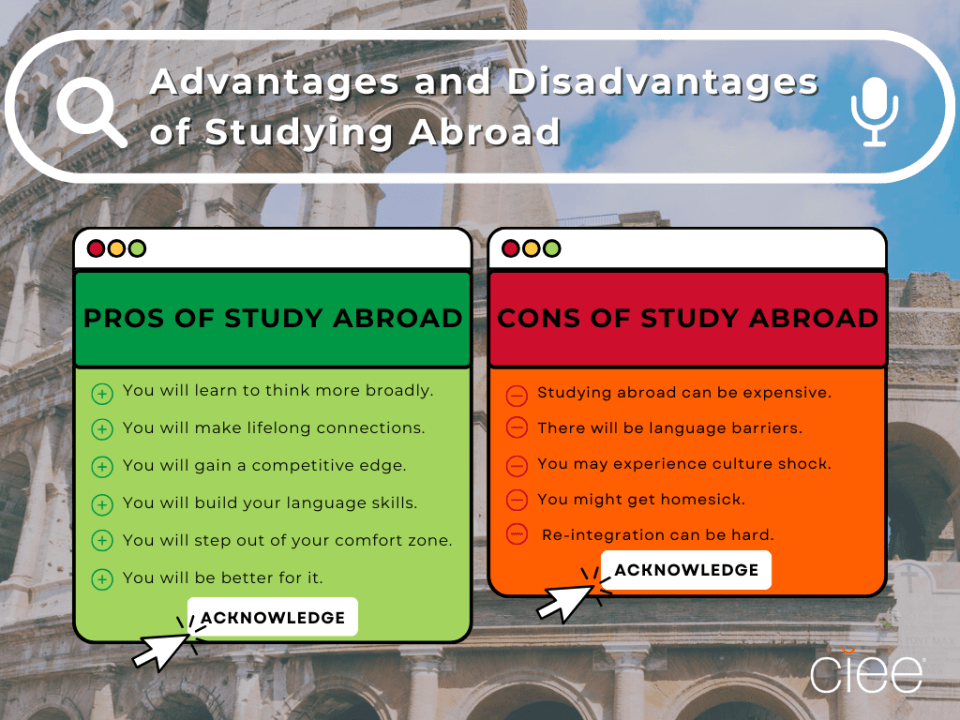
The Cons of Study Abroad
Charting new territory is not in everyone’s comfort zone. And studying abroad, for many students, is definitely classified as uncharted territory. We know the unknown can be intimidating, and we also know studying abroad comes with a bit of sacrifice.
This is why we’re sharing some of the disadvantages of studying abroad so you can make the most informed decision possible.
The Top 5 Disadvantages of Studying Abroad
Here are the cons of studying abroad you should address when weighing your decision:
1. Studying abroad can be expensive.
It can be . But there are scholarships and grants available to help you make studying abroad a reality . Your college or university may offer their own scholarship and grant options. Others you can apply for at CIEE directly in your CIEE Study Abroad application . We offer millions each year for students with demonstrated financial need, proven academic merit, or who’ve enrolled in specific programs as well.
On average, a semester with CIEE costs $18,861 . A little less when studying abroad in Latin America ($17,291) . A little more when heading to Europe ($19,968) .
Our Open Campus Block program option, in which you can choose one, two, or three consecutive six-week study abroad sessions, costs about $18,750 but drops significantly to a little over $6,000 for students who choose to pursue only one block (6 weeks) or about $12,000 for two blocks (12 weeks).
Bear in mind, too, that CIEE tuition provides a high level of student support. Not every program can say the same. Our program fee covers most of the essentials, outside of airfare and meals, and typically includes:
- Tuition
- Housing
- Pre-departure advising
- Orientation
- On-site staff + 24/7 emergency on-site support
- Cultural + co-curricular activities
- Travel protection

Read More: How Much Does it Cost to Study Abroad in 2024?
2. There will be language barriers.
Even for the most advanced speakers, immersion into a new culture will stretch your language capabilities. We see that as a really good thing. And we believe that if you go abroad with us, you will, too.
But there’s no getting around the fact that there will be a steep language learning curve as you make your way through the program. We bet you’re up for the challenge. Plus, most of our classes are taught in English, so you will still make big gains academically.
3. You may experience culture shock.
The food will be different. The language will be different. The architecture will be different. The style of communication will be different. The local customs and social norms will be different, too. You will have to adjust. But isn’t that at least some of the point? You will return home with a new perspective!
Read more: What is Culture Shock? 4 Examples and Tips to Adjust
4. You might get homesick.
Most of our students are traveling for the first time without their family or friends. And that’s a huge step that may cause homesickness .
Just know that CIEE offers a ton of support, including around-the-clock on-site staff. So, we’re always available. Plus, you’ll have a cohort of new friends to keep you company when those homesick feeling begin creeping up.
And remember , you can always call home when you need to hear a familiar voice. Our students love to FaceTime, Skype, Zoom, and so on to virtually connect with their loved ones whenever they want.

5. Re-integration can be hard.
This is an adjustment most students don’t anticipate.
Often, when the study abroad experience is really great and there’s a ton of personal growth, students have a hard time adjusting back into their typical routine back home. You may experience this, too. It’s a sort of homesickness for the study abroad culture.
Just know it will get better once you’ve had time to adjust to your routine again. And, for those who just can’t shake the feeling, there’s the opportunity to apply to join CIEE’s Student Ambassador Program to get paid to talk about your study abroad experience!
Learn More: Become a CIEE Student Ambassador
The Choice is Yours
Thinking through the advantages and disadvantages of studying abroad is an important first step in your study abroad experience. If you have any questions or want to talk through your personal list of studying abroad pros and cons, we ’re happy to connect .
In the meantime, check out t he 170+ incredible programs we have to offer to begin planning your perfect study abroad experience!
GET STARTED
- Activities & Excursions
- Foreign Language
- Planning/Packing
- Scholarships
© 2024 CIEE. All Rights Reserved.
- Privacy Notice
- Terms & Conditions

13 Studying Abroad Advantages And Disadvantages
- by Desmond Amos
- June 28, 2023

Studying abroad is a term used to describe the act of pursuing educational opportunities in a foreign country. It involves leaving one’s home country to enroll in an educational institution, usually a university or college, in another part of the world.
This academic journey allows students to experience a different culture, gain international exposure, and receive education in a global setting.
However, like any significant decision, studying abroad comes with its own set of advantages and disadvantages. In this article, we will explore both studying abroad advantages and disadvantages , helping you make an informed decision.
Studying Abroad Advantages and Disadvantages
Studying abroad has become an increasingly popular option for students seeking a global education experience. It offers the opportunity to immerse oneself in a new culture, gain a broader perspective, and acquire valuable skills.
we will explore the advantages and disadvantages of studying abroad, shedding light on the opportunities it presents as well as the potential pitfalls.
By examining both sides of the coin, prospective students and their families can make well-informed decisions about whether studying abroad is the right path for them.
Studying Abroad Advantages
Understanding the advantages of studying abroad is crucial for several reasons. Firstly, it allows students to make informed decisions about their educational journey.
By exploring the potential benefits, they can assess whether studying abroad aligns with their aspirations , values, and future plans.
This knowledge empowers them to select the most suitable program, destination, and institution that can offer the desired advantages.
1. Academic Advantages
Access to renowned educational institutions.
Studying abroad provides students with the opportunity to access renowned educational institutions that are recognized for their academic excellence and reputation. These institutions often have a long-standing history of producing successful graduates and conducting cutting-edge research.
By studying at such institutions, students can benefit from the expertise of experienced faculty members, gain exposure to rigorous academic standards, and receive an education that is highly regarded both nationally and internationally.
Exposure to diverse Academic Programs and Disciplines
Studying abroad opens doors to a wide range of academic programs and disciplines that may not be available or as specialized in one’s home country.
Students can explore unique fields of study, interdisciplinary programs, and niche subjects that align with their interests and career aspirations.
The exposure to diverse academic programs allows students to broaden their knowledge base, think critically from multiple perspectives, and discover new intellectual passions.
Learning from Distinguished Professors and Experts
Studying abroad often involves learning from distinguished professors and experts in their respective fields. These professors bring a wealth of knowledge, research expertise, and real-world experience to the classroom. Interacting with such accomplished educators allows students to benefit from their insights, mentorship, and guidance, fostering intellectual growth and expanding their understanding of the subject matter.
Access to Advanced Research Facilities and Resources
Many renowned universities abroad offer state-of-the-art research facilities and resources to their students. These facilities provide access to cutting-edge technology, well-equipped laboratories, specialized libraries, and extensive databases.
Students can engage in research projects, collaborate with faculty members, and explore their own intellectual curiosities. The exposure to advanced research facilities enhances the learning experience, encourages critical thinking, and prepares students for future academic pursuits or professional endeavors.
2. Cultural Advantages
Immersion in a new culture and language.
One of the most significant advantages of studying abroad is the opportunity for cultural immersion. Students get the chance to live in a new country, interact with locals, and experience day-to-day life from a different cultural perspective.
Immersion in a new culture exposes students to unique traditions, customs, and ways of life, fostering a deeper understanding and appreciation of cultural diversity.
Development of Cultural Awareness and Sensitivity
Studying abroad promotes the development of cultural awareness and sensitivity. Through interactions with people from different backgrounds, students gain firsthand experience of cultural nuances, values, and social norms.
This exposure helps students become more adaptable, flexible, and respectful of diverse cultures. It enhances their ability to navigate cross-cultural situations, communicate effectively with people from different backgrounds, and collaborate in multicultural environments.
Exposure to Different Perspectives and Worldviews
Studying abroad offers exposure to a variety of perspectives and worldviews. Students interact with peers from different countries, engaging in discussions and exchanging ideas on a range of topics.
This exposure to diverse perspectives broadens their own worldview, challenges preconceived notions, and encourages critical thinking. It enables students to approach problems and situations with a more open-minded and global perspective.
Opportunities to Explore Historical Landmarks and Cultural Heritage
Studying abroad provides opportunities to explore historical landmarks, cultural heritage sites, and iconic attractions of the host country.
Students can visit museums, galleries, historical sites, and natural wonders, immersing themselves in the rich history and cultural heritage of the region.
This firsthand experience allows students to deepen their understanding of the host country’s traditions, art, architecture, and historical significance, enriching their cultural knowledge and appreciation.
3. Personal Development Advantages
Enhancing independence and self-reliance.
Studying abroad offers an excellent opportunity for personal growth by fostering independence and self-reliance. Being away from familiar support systems encourages students to navigate daily life tasks independently, such as managing finances, handling accommodations, and making important decisions.
This newfound independence allows students to develop self-confidence, self-awareness, and a sense of responsibility, which are valuable traits that can be applied to various aspects of life beyond the study abroad experience.
Building resilience and adaptability
Living and studying in a foreign country can present unique challenges and unexpected situations. Students must adapt to a new cultural, social, and educational environment, which requires resilience and adaptability.
They learn to overcome obstacles, adjust to unfamiliar routines, and embrace ambiguity. These experiences build resilience, flexibility, and the ability to thrive in diverse and dynamic settings.
Developing Problem-solving and Critical Thinking Skills
Studying abroad provides numerous opportunities for students to develop problem-solving and critical thinking skills. They encounter cultural differences, language barriers, and unfamiliar situations that require innovative thinking and creative problem-solving.
Adapting to new academic systems, engaging in cross-cultural teamwork, and navigating through challenges sharpen students’ analytical skills, enhance their ability to think critically, and broaden their problem-solving capabilities.
Expanding Global Network and Friendships
Studying abroad enables students to build a global network and establish friendships with peers from around the world. Interacting with diverse individuals, sharing experiences, and collaborating on academic projects create lasting connections and broaden social horizons.
These global friendships not only enrich the study abroad experience but also expand future opportunities for international collaborations, cultural exchanges, and a network of professionals across different countries.
4. Language Proficiency Advantages
Immersion in a language-learning environment.
Studying abroad provides a unique opportunity for language immersion. Being surrounded by native speakers and having daily interactions in the target language accelerates language learning.
Immersion in a language-learning environment enables students to practice the language in real-life situations, enhancing their listening, speaking, reading, and writing skills.
Opportunities for language practice and fluency
Studying abroad offers abundant opportunities for students to practice the language they are studying. Whether it is attending lectures, engaging in discussions with local classmates, or participating in cultural activities, students are exposed to constant language practice.
This regular practice contributes to improved fluency, vocabulary expansion, and overall language proficiency.
Improved communication skills and intercultural competence
Studying abroad fosters the development of strong communication skills and intercultural competence. Engaging with individuals from different linguistic and cultural backgrounds requires effective communication strategies, including active listening, cross-cultural sensitivity, and adapting communication styles.
These experiences enhance students’ ability to communicate effectively in multicultural settings, fostering empathy, understanding, and the ability to bridge cultural gaps.
Competitive Advantage in a Global Job Market
Proficiency in multiple languages and strong communication skills are highly valued in today’s global job market. Employers seek candidates with the ability to communicate with diverse audiences, navigate multicultural environments, and engage in international business relations.
Studying abroad and gaining language proficiency provide a competitive advantage, as it demonstrates an individual’s cross-cultural adaptability, intercultural competence, and global perspective, making them more desirable to prospective employers.
5. Career Advantages
Exposure to international job opportunities.
Studying abroad provides students with exposure to international job opportunities. Being immersed in a different cultural and professional environment allows students to develop a global perspective and understanding of diverse industries.
They may have the chance to network with professionals from different countries, participate in internships or part-time jobs, and gain practical experience in an international setting. This exposure enhances their chances of securing employment abroad or in multinational companies that value international experience and a global mindset.
Demonstrating adaptability and global mindset to employers
Studying abroad showcases a student’s adaptability and global mindset to potential employers. Employers value individuals who can navigate different cultures, work effectively in multicultural teams, and adapt to diverse work environments.
Studying abroad demonstrates a candidate’s ability to handle challenges, adapt to new situations, and embrace cultural diversity. This experience highlights qualities such as flexibility, open-mindedness, and cross-cultural communication skills, making students more attractive to employers seeking candidates with a global perspective.
6. Personal Growth and Maturity
Gaining a sense of independence and self-discovery.
Studying abroad fosters personal growth and maturity by allowing students to gain a sense of independence and self-discovery.
Being away from familiar support systems and immersing oneself in a new environment encourages self-reliance, self-reflection, and personal development. Students learn to navigate daily life challenges, manage their responsibilities, and make decisions on their own.
This sense of independence fosters self-confidence, self-awareness, and a better understanding of one’s strengths, weaknesses, and aspirations.
Challenging comfort zones and expanding horizons
Studying abroad pushes students to challenge their comfort zones and expand their horizons. It encourages them to step outside their familiar environment, embrace new experiences, and engage with diverse perspectives.
Students are exposed to different cultural, social, and educational norms that challenge their preconceived notions and broaden their worldview. This exposure fosters personal growth, increases tolerance for ambiguity, and encourages the development of a more inclusive and global mindset.
7. Financial Advantages
Scholarships and financial aid opportunities.
Studying abroad can offer various scholarships and financial aid opportunities specifically designed for international students. Many governments, educational institutions, and private organizations provide scholarships, grants, and fellowships to support students pursuing education abroad. These financial resources can significantly reduce the financial burden of studying in a foreign country and make it more affordable for students from diverse backgrounds to access international education.
Cost-effective education in certain countries
In certain countries, studying abroad can be a cost-effective option compared to pursuing education in one’s home country.
Tuition fees, living expenses, and overall education costs may be lower in some destinations, making it financially advantageous for students seeking quality education at a more affordable price.
Students can research and identify countries or institutions that offer excellent academic programs and a favorable cost of living, enabling them to obtain a high-quality education without incurring excessive financial strain.
Potential for part-time work and internships abroad
Studying abroad often provides students with opportunities for part-time work and internships, allowing them to earn money and gain valuable work experience while studying. Many countries allow international students to work part-time during their studies, enabling them to cover their living expenses or contribute to their educational costs.
Additionally, internships in a foreign country provide students with practical, industry-specific experience, enhancing their employability and potentially offsetting some of their expenses.
Studying Abroad Disadvantages
By exploring these potential disadvantages of studying abroad, individuals can make well-informed decisions and adequately prepare themselves for the challenges they may face.
It is important to note that while these disadvantages exist, they can often be mitigated with proper planning, support systems, and a proactive approach to addressing potential issues.
1. Cultural and Social Challenges
Language barriers and communication difficulties.
Studying abroad often involves immersing oneself in a new language and culture. Language barriers can pose challenges in communication, both in academic and everyday life settings. Limited proficiency in the host country’s language may hinder effective interaction with local peers, professors, and members of the community.
Students may face difficulties in expressing themselves, understanding instructions, or fully engaging in classroom discussions.
Overcoming language barriers requires dedication, language learning efforts, and seeking opportunities for language practice and improvement.
Cultural Adjustment and Homesickness
Adjusting to a new culture and way of life can be overwhelming for students studying abroad. Cultural norms, social customs, and traditions may differ significantly from what they are accustomed to.
This adjustment process can involve adapting to new social expectations, food, weather, and daily routines. Additionally, being away from family, friends, and the familiar support system can lead to homesickness. Students may feel a sense of longing for their home country, experiences, and loved ones.
Coping with cultural adjustment and homesickness requires resilience, openness, and seeking support from fellow students, mentors, and counseling services.
Social Isolation and feeling out of place
Studying abroad can sometimes lead to feelings of social isolation and a sense of being out of place. Being in a foreign environment without established social networks or close relationships may make it challenging to form connections with local students or integrate into existing social circles.
Students may experience difficulties in making friends or feeling fully included in social activities. Overcoming social isolation requires proactive engagement, participating in campus organizations, attending cultural events, and reaching out to fellow students or international student support services.
2. Financial Considerations
High cost of tuition and living expenses.
One of the major challenges of studying abroad is the high cost associated with tuition fees and living expenses. International student tuition fees may be higher compared to domestic students, making education in a foreign country a significant financial investment.
Additionally, the cost of accommodation, transportation, meals, and other daily expenses can be substantial. It is important for students and their families to carefully budget and plan for these expenses, considering the currency exchange rates and potential fluctuations.
Limited Access to Financial Aid and Scholarships
International students may face limited access to financial aid and scholarships offered by host countries or educational institutions.
Scholarships and grants specifically targeted towards international students are often competitive and may have specific eligibility criteria.
The lack of financial aid opportunities can pose financial challenges for students studying abroad, increasing their reliance on personal savings, family support, or part-time work opportunities.
3. Academic Considerations
Differences in educational systems and teaching styles.
Studying abroad often involves adapting to a different educational system and teaching styles. The curriculum, evaluation methods, and classroom dynamics may vary from what students are familiar with in their home country.
Adjusting to new approaches to learning, academic expectations, and assessment methods can be challenging initially. Students may need to invest extra effort in understanding and adapting to the new academic environment.
Language barriers Affecting Academic Performance
Language proficiency plays a significant role in academic success while studying abroad. Students whose first language is not the language of instruction in their host country may face difficulties in understanding lectures, reading academic texts, and expressing themselves in written assignments.
Language barriers can impact academic performance and may require additional language support, such as language courses or academic writing assistance.
4. Personal and Emotional Challenges
Emotional stress and mental health issues.
Studying abroad can put individuals under emotional stress due to the significant life changes, cultural adjustment, and the pressure to adapt to a new environment.
It is common for students to experience a range of emotions, including homesickness, loneliness, anxiety, and even depression. Being aware of and addressing one’s mental health needs is essential. Universities often provide counseling services and support groups for international students to help navigate these emotional challenges.
Being far away from family and support systems
Being physically distant from family and familiar support systems can be emotionally challenging for students studying abroad.
The absence of close family and friends may make it difficult to cope with personal challenges, celebrate milestones, or seek immediate assistance in times of need. Building new support networks and seeking emotional support from fellow students, mentors, and campus resources can help alleviate feelings of isolation and homesickness.
5. Health and Safety Concerns
Access to quality healthcare and insurance coverage.
Studying abroad means being in a new healthcare system, which may differ from what students are accustomed to in their home country.
Access to quality healthcare services, understanding insurance coverage, and knowing how to seek medical assistance can be challenging. Students should familiarize themselves with the local healthcare system, obtain appropriate health insurance coverage, and be proactive in seeking medical care when needed.
Safety Risks and Concerns in Unfamiliar Environments
Living in an unfamiliar environment exposes students to potential safety risks and concerns. Different countries and cities may have varying levels of safety, and students need to be aware of their surroundings, adhere to local safety guidelines, and take necessary precautions to ensure their well-being.
Universities often provide safety information, emergency protocols, and support services to assist students in navigating potential safety concerns.
It is crucial for prospective students to thoroughly evaluate their individual circumstances, interests, and goals before embarking on a study abroad journey.
Proper planning, research, and seeking guidance from academic advisors and support services can help students navigate the potential pitfalls and maximize the benefits of studying abroad .
Ultimately, the decision to study abroad should be made after careful consideration of both the advantages and disadvantages.
With the right mindset, preparation, and support, studying abroad can be a transformative experience that equips students with valuable skills, broadens their horizons, and prepares them to thrive in an increasingly interconnected and diverse world.
- studying abroad advantages
- studying abroad disadvantages
Desmond Amos
Leave a reply cancel reply.
Your email address will not be published. Required fields are marked *
Save my name, email, and website in this browser for the next time I comment.
How To Apply For Scholarship In Canada For Masters
How to apply for uk student visa in nigeria, you may also like.

- 7 minute read
7 Free Benefits Of Studying Abroad
- June 1, 2023

- 6 minute read
13 Top Educational Consultants in Nigeria
- September 11, 2023

- 4 minute read
15 Study Abroad Agents in Abuja

Can I use NECO Result To Study Abroad – 3 New Things You Should Know

- 8 minute read
15 Study abroad agents in Lagos

List Of Countries That Accept NECO Result

The Benefits of Studying Abroad
- Click to share on Facebook (Opens in new window)
- Click to share on Twitter (Opens in new window)
- Click to share on LinkedIn (Opens in new window)
Studying abroad is an exciting opportunity for students to explore new cultures, gain new experiences, and broaden their perspectives. It is a chance to step out of your comfort zone and into a new world, and the benefits of studying abroad are endless.
In this article, we will explore the reasons why studying abroad is a life-changing experience and examine the pros and cons, and considerations that should be taken before making the decision.
If you do decide to study abroad, one thing you’ll definitely need to find is student accommodation . Here at Student.com we list over 1 million beds in over 400 cities across the world.
Why studying abroad is a life-changing experience?
Studying overseas presents a multitude of advantages that go beyond pure academic education. There are numerous reasons why studying abroad is beneficial, such as gaining exposure to diverse cultures, acquiring new language skills or improving existing ones, personal growth and development, and expanding career opportunities.
By studying abroad, individuals have the opportunity to fully immerse themselves in a new culture, gain insights into different customs and ways of life and encounter novel ways of living. Moreover, this type of experience provides a chance for students to practise the local language regularly, which can be advantageous for future job prospects.
In addition, studying abroad can help students cultivate independence, self-assurance, adaptability, and problem-solving skills while providing them with a global perspective on various issues.
Finally, studying abroad can bolster a student’s CV and job prospects, demonstrating their willingness to take risks, adapt to new surroundings, and acquire new proficiencies.

Why study abroad?
Studying abroad presents a unique opportunity for students to reap several benefits, such as:
- Discovering new adventures: Studying abroad opens up avenues for students to explore new destinations and engage in exciting adventures.
- Improving language proficiency: Studying abroad can help students hone their language skills, acquire new languages, and enhance their future job prospects.
- Gaining insight into diverse educational systems: Studying abroad gives students a chance to gain insights into diverse educational systems, which can broaden their outlook and comprehension of various teaching methodologies.
Pros and cons of studying abroad
Studying abroad is an exciting opportunity for students to explore new cultures, gain new experiences, and broaden their perspectives. It is a chance to step out of your comfort zone and into a new world, but like any decision, studying abroad comes with both pros and cons.
Pros of studying abroad
- Exposure to new cultures: Studying abroad allows students to immerse themselves in a new culture, learn about different customs and lifestyles, and experience new ways of living.
- Language skills: Studying abroad can be an opportunity to learn a new language or improve existing language skills. It offers an immersive experience, allowing students to practise the language daily, which can be beneficial for future job opportunities.
- Global perspective: Studying abroad offers a global perspective, providing students with the opportunity to learn about global issues, understand cultural differences and similarities, and gain insight into international relations.
- Personal growth: Studying abroad is a chance for students to develop independence, confidence, adaptability, and problem-solving skills. It can also foster a sense of self-awareness and broaden one’s understanding of themselves and the world around them.
- Career prospects: Studying abroad can enhance students’ resumes and job prospects, demonstrating their willingness to take risks, adapt to new environments, and learn new skills.

Cons of studying abroad
- Culture shock: Studying abroad can be challenging for students who experience culture shock. It can take time to adapt to a new culture, and students may feel homesick, isolated, or overwhelmed.
- Financial considerations: Studying abroad can be expensive, and you may need to cover tuition fees, travel, accommodation, and daily living expenses, which in some cases may be higher than they would be in your home country.
- Academic challenges: Studying abroad may involve adapting to a new educational system, which can be challenging. Students may struggle with language barriers, different teaching methods, or academic expectations.
- Distance from family and friends: Studying abroad can be emotionally challenging for students who are far away from their family and friends. They may miss important events, birthdays, or holidays, and feel isolated or disconnected from their support networks.
- Visa and immigration issues: Depending on where you are from and where you will be studying in, you may need to deal with visa and immigration issues, such as obtaining the necessary student visa.
Students should weigh the pros and cons before deciding to study abroad, consider their personal goals and priorities, and explore the available support and resources. Studying abroad is an opportunity for personal growth and development, and by taking the time to make an informed decision, students can have a fulfilling and rewarding experience.
Should I study abroad?
When considering whether to study abroad, students should reflect on their goals and priorities. Personal and academic aspirations are an important factor. You should consider your academic goals and how studying abroad might impact your academic progress.
Financial factors are also important. You should carefully consider the costs associated with studying abroad. Think about if you are able to afford it, and make sure to look into possible scholarships and grant opportunities that may help cover some or all of your expenses.
Also make sure to look into available support and resources you could use. Organisations such as study abroad offices, local embassies, and student associations are used to dealing with exchange students and they may be able to offer you valuable insights and ideas you might not have thought of yourself.

Final thoughts
Studying abroad can be a transformative experience that brings various advantages like acquiring a global perspective, immersing oneself in diverse cultures, enhancing language skills, personal growth through adventure and making lifelong friendships. However, it also comes with potential difficulties such as culture shock and financial constraints.
Therefore, students should weigh the benefits and drawbacks and evaluate their personal aspirations to make an informed decision about studying abroad. Pursuing education overseas is a chance to expand one’s outlook and encounter life-changing experiences that can have lasting impacts.
Navigating Your Graduate Studies Journey
AI-Powered Learning Revolution: How Tech Supercharges Your Studies
Exam success strategies: your ultimate guide for the academic final stretch, transforming travel into a career path: a comprehensive guide, the ultimate student guide to traveling smart and embracing global citizenship, unlocking visa sponsored job opportunities in the uk.

14 Pros and Cons of Studying Abroad in College (from a Study Abroad Expert)
A World in Reach contains affiliate links. If you make a purchase through these links, I may receive a commission at no cost to you! Read my full disclosure here .
One of the biggest decisions college students have to make is whether or not to study abroad.
Like any major life decision, there are both pros and cons of studying abroad. On one hand, studying abroad is an amazing opportunity to see the world and learn about new cultures.
On the other hand, studying abroad can be expensive. And, depending on your degree, it might be difficult to meet your requirements abroad.
I was lucky enough to study abroad four times while completing my undergraduate degree. You could say that I’m kind of an expert when it comes to studying abroad.
I studied intercultural communication in Dublin , explored Cuba’s healthcare system in Havana, assisted a non-profit organization with water sample testing in Ecuador , and learned about the pros and cons of China’s education system.
All four programs were very different, and each one provided me with valuable educational and professional experience. They also sparked my love for travel !
There were definitely advantages and disadvantages to studying abroad that I considered when planning my programs (and experienced while being overseas), but for me, the advantages outweighed the disadvantages.
To help you decide if studying abroad is right for you, I’ve put together this list of pros and cons of studying abroad.
These are all based on my personal experiences that I had during my four study abroad programs, and hopefully, they will help give you a realistic look at all of the studying abroad pros and cons!
Table of Contents
Pros of Studying Abroad
There are SO many advantages to studying abroad. Study abroad isn’t only beneficial during your time in college. It can pave the way for countless experiences throughout your life.
Here are some of the biggest pros of studying abroad!
1. You’ll be able to get out of your comfort zone.
The first time I left the United States was when I studied abroad for the first time in Dublin, Ireland .
I had only been on a plane three times before that trip, and while traveling internationally was always a dream of mine, it was never a possibility for me until I was able to study abroad.
Even though Ireland isn’t too different from the United States, traveling somewhere out of the country was definitely out of my comfort zone.
I was a first-generation college student who spent my entire pre-college life in a tiny town. None of my family (and few of my friends) had ever even considered traveling abroad, so I didn’t really know what to expect when I applied for the study abroad program.

Seven years later, I am SO glad I decided to fill out that application. That first big step of getting out of my comfort zone has opened me up to so many exciting opportunities throughout the years, from traveling independently to trying new foods.
Studying abroad is the perfect stepping stone to getting out of your comfort zone – in a big way. Once you make that big step, you’ll be prepped to take on so many wonderful opportunities in the future.
2. You’ll have the opportunity to travel and see new places.
For as long as I can remember, I’ve dreamed of seeing the world.
Before studying abroad, I was able to explore quite a bit of my home country, but I always longed for more.
After spending two weeks in Ireland, seeing everything from the Book of Kells to the Cliffs of Moher, I was hooked. Since, I’ve had a craving for seeing the monuments, landmarks, historic artifacts, and natural beauties that I once dreamed of.
Thanks to studying abroad, I’ve been able to explore the Old Town of Havana, Cuba, haggle at markets in Ecuador, explore the charming city of Dublin, climb the Great Wall of China, and so much more.
I’m so grateful that studying abroad afforded me these opportunities. Also, thanks to getting out of my comfort zone, I’ve explored even more places independently, like London, Paris, and Tokyo.

If you spend a longer amount of time abroad, like a full semester, you’ll have even more time for traveling and exploring! Many of my friends who spent semesters abroad traveled to a new place every weekend.
There are also programs like Semester at Sea that visit around a dozen countries over the semester, allowing you to experience a host of different places and cultures.
3. Studying abroad is the perfect opportunity to learn a new language.
If language learning is of any interest to you, studying abroad is one of the best ways to brush up on your skills.
Most universities offer study abroad programs for different foreign languages. Some immersive programs are tailored for advanced speakers who have a good grasp of the language already, while others are great for beginners. So, no worries if you aren’t already fluent in another language!
None of my programs were language-focused, but I was able to expand on my novice Spanish skills in Cuba and Ecuador and pick up a bit of Mandarin in China.
Even if you don’t take language classes while abroad, you can definitely start the language learning process during your program.
4. You’ll be able to experience different cultures first-hand.
Have you ever read a book or watched a movie taking place in a different country and thought, “Wow, I’d love to experience this culture for myself!”
By studying abroad, you can!
If a certain country’s culture is appealing to you, why not consider studying abroad there? There is no better way to immerse yourself in a culture than by actually being there.
You’ll have the opportunity to take part in local holidays or ceremonies, experience local traditions, try new foods, meet locals, and learn more about what life is like in that country.

5. Studying abroad allows you to gain unique experience in your field of study.
For most of my study abroad programs, I chose them because they covered unique topics within my field of study.
As a public health major, I was able to learn more about one of the most unique healthcare systems in the world in Cuba and gain practical experience working with a public health-related non-profit in Ecuador.
Though not specifically public health-related, learning about Intercultural Communication in Ireland was helpful in many ways, from collaborating with colleagues from different countries and cultures than my own to understanding different methods for communicating between cultures.
Completing an internship abroad is another option, as is student teaching abroad. I even have friends in professional schools (Physician Assistant, Pharmacy, and Medical schools) who completed some of their required rotations abroad!
Most American universities have dedicated Study Abroad or International Education offices, with advisors who can help find a program that is specifically tailored towards your career interests. If you want to find a study abroad program that is in line with your future career goals, set up a meeting with your school’s office to explore possible programs.
6. Studying abroad is a great resume booster.
Similar to my last point, studying abroad is a great way to boost your resume and potential job prospects.
Every time I applied for a study abroad program or attended an informational session, there was one statement that was echoed: employers love when employees have studied abroad!
Study abroad experience shows that you are able to quickly adapt to new environments and situations, which is a highly sought-after quality in the professional world. Knowing a second language is another impressive skill that can be elevated when studying abroad.
Plus, gaining unique professional experience while abroad (like working on water testing or interning at an international marketing firm) is a huge resume booster that will set you apart from other applicants!
Studying abroad is also a great way to connect with professors and mentors. All of my study abroad programs were taught by professors from my university.
I was able to make deeper connections than I would have in a traditional classroom, and those professors served as wonderful mentors for graduate school. They even wrote letters of recommendation when I applied for my Master’s program!
7. You’ll have the opportunity to make new friends from all over the world!
Making new friends is a huge pro of studying abroad. Thanks to my study abroad experiences, I’ve made a few lifelong friends from all over the world.
Many study abroad programs involve being essentially an exchange student at a foreign university, meaning that you’ll be taking classes alongside local students. This is a great way to meet new people, as there’s a decent chance that you won’t know anyone else there!
All of my programs were official university-sponsored programs, meaning that I went abroad with fellow students and faculty from my school. For most of the programs, I didn’t know any of the other students going, but I came home with a great group of friends.
I was also still able to meet locals – one of the girls I went abroad with is now married to a guy she met in Dublin!
There are so many opportunities to make connections and meet new people while studying abroad, whether those people are locals in the destination you’re studying or fellow students from your home school.
8. You’ll never run out of stories to tell your friends and family.
I am a self-admitted annoying study abroad girl.
I love sharing my stories from studying abroad with my friends, family, co-workers, and really anyone who will listen. That’s why I started this blog!
Studying abroad will give you SO MANY amazing stories to tell, from crazy travel mishaps to incredible experiences. I love telling people about my experience of nearly getting robbed in Ecuador just as much as I love telling them about how people were running a marathon on the Great Wall of China on the day of my visit (seriously, how much crazy does it take to run a marathon on the steep-AF Great Wall of China?!)
If you study abroad, you’ll come home with enough stories from your experience to write a memoir.

Cons of Studying Abroad
With any major decision in life, there will always be some disadvantages. Study abroad included – while the vast majority of experiences surrounding your study abroad journey will likely be positive, there are some downsides, too.
Here are a few of the cons of studying abroad.
1. Studying abroad can be expensive.
Not going to lie, there is definitely a financial burden that can come with studying abroad.
Typically, the fees for your study abroad program will vary depending on the length and type of the program.
Overall, semester-long programs tend to be more costly than short-term programs when you take into account all of the expenses associated with the program: tuition, required program fees, airfare, daily expenses, visas, etc.
However, many universities have agreements with partner schools that keep the tuition fees at the university abroad the same as what you’d be paying for tuition at your home school. With programs like these, your expenses for studying abroad might not be significantly more than staying home!
Sometimes, tuition at schools abroad is even less than at your home school. I could’ve spent an entire semester in Quito, Ecuador for half of what I paid in the USA.
In most cases, you can also apply any scholarships or financial aid that you receive to your study abroad program.
Short-term programs, while cheaper than semester-long ones, can often have a higher financial burden than semester-long programs.
My Dublin study abroad program was for two weeks over the summer, and I paid over $7000 after scholarships. I could have studied for a semester for cheaper because I would have been able to apply my regular scholarships and financial aid towards the tuition for the semester.
I don’t regret doing that program, but I do wish that I had done more research into financial aid and scholarships. There were fewer options available since it was a short-term program, but I likely could have knocked a few thousand dollars off the cost had I applied for more scholarships.
Speaking of scholarships, there are often study abroad scholarships offered by universities to specifically assist with study abroad costs. Check with your university’s study abroad office for more details!
Also, once you’re abroad, simply being a student can save you money on things like museum admission fees, restaurants, and more! Make sure to bring along your student ID and apply for an ISIC (International Student Identity Card) before you leave home!
2. Depending on your degree, it may be hard to fulfill degree requirements while studying abroad.
Some degrees, especially those in STEM, have a strict schedule of classes that must be taken at certain times in order to graduate on time.
Because of this, many students may feel that studying abroad isn’t an option for them, since it could make it harder to meet requirements in order to graduate on time.
If this sounds like the case for you, I highly recommend meeting with a study abroad advisor at your university as well as your academic advisor to go over possible study abroad options.
While a semester-long program might not work for you, summer or winter programs could be perfect! My university even had specific summer programs designed for majors with a strict course load, like Engineering and Nursing.
Another option is to look into taking your core classes abroad. Studying abroad early in your college career can allow you to knock these required classes out, and it is typically easy to find equivalents for those core classes.
Need an art class? What’s better than taking an art class in Florence, Italy ? Required to take an English class? Why not take English lit in London?
3. Adjusting to a new culture while taking classes can be difficult.
Culture shock is a real thing, and having to take classes while experiencing culture shock can be difficult.
It can manifest in many different ways, such as feeling overwhelmed, homesickness, or even depression.
It’s totally normal to feel culture shock when experiencing a culture that’s different from your own. When I first landed in Havana, Cuba, I was immediately overwhelmed. The sights, smells, and foods were so different than anything I had ever experienced before – and I was ready to go home soon after I arrived.
Things changed though. I slowly became acclimated and soon, the excitement of experiencing the unknown was way higher than the shock of experiencing such a different place. By the end of my time there, I didn’t want to leave!
If culture shock hits you while studying abroad, don’t stress. Here are a few ways to overcome culture shock:
- Give yourself time to adjust. It takes time to get used to a new culture, so don’t expect to feel comfortable right away. If you need to spend some time doing activities that are comfortable to you, like watching Netflix in bed, do it. But don’t do it for too long, because there is an amazing destination out there that’s ready to be explored.
- Learn about the culture before you go. This is especially important if you’re traveling somewhere that’s significantly different culturally from your home. Research some of the local customs so that you know what to expect when you arrive.
- Be open-minded. Don’t expect everything to be the same as it is at home. Be open to new experiences and you’ll find that studying abroad is an amazing opportunity to learn and grow!

4. Language barriers can be tricky.
Planning on studying abroad in a country that speaks a language you don’t know?
Language barriers can be tricky when studying abroad. They can make everything harder, from big things like understanding what you’re learning in class to small things like ordering at a coffee shop.
The best way you can prepare for language barriers is to do a bit of language learning before leaving home. You don’t have to be fluent (or anywhere close), but learning a few key phrases can make a world of a difference.
For starters, learning basic greetings (like hello and goodbye), how to ask “Do you speak English?”, how to order at a restaurant, and how to ask where the bathroom is makes for a good start.
I also recommend learning food words, like words for different meats and vegetables. Being able to know what you’re ordering when looking at a foreign menu makes a huge difference! It’s also really helpful if you have any food allergies so that you can alert the waitstaff before ordering.
5. Homesickness happens.
People love to say that it won’t happen to them. Me included – I swore up and down that I wouldn’t get homesick while studying abroad. They were all short term programs. Surely I could handle being away for a couple of weeks, right?
Spoiler alert: I was wrong.
Homesickness can manifest in a lot of ways. Sometimes you might miss people, like your family, friends, or your dog. Other times, you might miss comforts from home, like your bed. And sometimes, you miss random things like your favorite Mexican restaurant.
If you find yourself feeling homesick, make a list of things that make you feel at home. This could be things like your favorite foods, movies, or activities. Try to find local equivalents so you can still enjoy these things while you’re away.
When I was missing Mexican food in Ecuador, I went to a Mexican restaurant in Quito. It wasn’t as good as my favorite spot back home, but eating some of the similar flavors was comforting.
And if you find yourself missing your family or your bestie, carve out some time to Facetime them and show them what you’re up to. Trust me, your mom would LOVE it if you Facetimed her with a view of the Eiffel Tower or Big Ben!
6. If you study abroad, you might feel like you’re missing out on traditional college experiences.
When I asked some of my friends why they didn’t study abroad, there was an answer that was common among all of them.
They were afraid that they’d miss out on common US college experiences like going to football and basketball games or attending frat parties.
Sure, if you’re spending a full semester abroad, you might miss out on some of these things for a semester.
But, if you just spend one semester abroad, you’ll still have around 7 more to get all of those traditional college experiences in!
Plus, what sounds more fun – attending a frat party back home or bar hopping in Europe? I think you know the answer!
Overall Study Abroad Pros and Cons
As you can see, there are both pros and cons to studying abroad. However, even for the disadvantages, there are work-arounds and ways to manage.
Studying abroad was the best thing I could have ever done, and I’m a firm believer that any college student who has the ability should do it.
Thanks to studying abroad, I’ve become a much more confident and culturally competent student, traveler, and now, a working professional.
Making the decision to study abroad is a big one, but it can pay off big time in the future.
Hopefully, I’ve inspired you to study abroad and expand your horizons as a college student!
Want to read more about studying abroad? Check out these posts:
- Study Abroad in Florence, Italy
- The Ultimate Guide to Studying Abroad in Croatia
Enjoy this post? Pin it to save for later!

After traveling outside of the US for the first time while studying abroad, I quickly developed a love for travel and an obsession for exploring as much of the world as possible. Now, I'm on a mission to teach college students, young adults, and anyone else who wants to see the world how to travel while minimizing their expenses and maximizing their experiences.

Scholarships
Events & Webinars
Course Finder
Universities
Counsellors
Back to all Blogs

What Are the Advantages and Disadvantages of Studying Abroad?
The most crucial aspect of everyone's life is now education. It is claimed to improve one's quality of life and foster deep regard for society.
College students who have the opportunity of studying abroad can immerse themselves in a new culture, improve their language skills, and enrol in courses with an international focus. Where should you go to study abroad, though?
There are several options, including France, Italy, Australia, and Japan . Where should you go, though? What if you are unable to travel as frequently as you would like? Will it be possible for you to adapt to residing in a nation where English isn't the official language? This essay will examine all the advantages and potential drawbacks of studying abroad.
Students studying abroad can interact with people from different cultures and experience new cultures firsthand. You gain a better knowledge of regional cultures, norms, and values. Additionally, it opens new doors and widens your perspectives.
While there are many advantages, there are also some disadvantages of studying abroad. Let's take a look at:
The Ultimate List of the Pros and Cons of Studying Abroad
Advantages of studying abroad.
1. Language skills are Improved by Studying Abroad
Studying abroad is a fantastic opportunity to develop your language abilities. You'll be surrounded by as many individuals who speak that particular language as you can, so eventually, it will rub off on you. Additionally, you'll be able to observe how other cultures and societies function, which can broaden your overall knowledge.
2. Experience a Different Teaching Method
Studying abroad can be an incredible experience. You will interact with new people, observe how other cultures approach education and experience a different teaching method. Many students never get the chance to learn about themselves or develop confidence in their talents while at home, so studying abroad is a fantastic opportunity.
3. Improve your Network
Studying abroad is a fantastic way to expand your network and meet people you probably wouldn't have otherwise. Travelling with learning about other cultures and lifestyles will help you discover more about who you are. It can be simpler to adjust to a new environment and try new things without feeling overwhelmed with the support of other students who are experiencing the same thing.
4. Enhances Resume
Although studying abroad may not seem like a big thing to some, it is an essential consideration when applying for jobs. It demonstrates your willingness to take chances and give up something to accomplish your objectives. Studying abroad is an experience that will only help you understand what career path to choose in the future, whether or not you receive the job you applied for.
5. Gain Self-assurance
Studying abroad is a once-in-a-lifetime chance to step outside your comfort zone. Gaining this confidence will be of immeasurable value to you and will enable you to handle any challenging circumstances that may happen in the future. They allow you to interact with people from around the world with various viewpoints. Studying abroad will broaden your worldview and improve your readiness for whatever is ahead.
6. Increased Professional Opportunities
Studying abroad offers countless opportunities. When you return home, your thoughts on the same job prospects you formerly perceived as inaccessible to you may have changed entirely. Because you will have been exposed to so many diverse cultures and job paths outside of your own, you will also have additional alternatives for work.
7. Creating an Independent Lifestyle
Studying abroad helps students create an independent lifestyle by improving their self-reliance and highlighting their learning curve. For instance, a student who attends school in their hometown will not have the opportunity to learn how to live independently. Their dependence will cause them to feel most at ease in their immediate social circle. Thanks to their international studies, they will learn how to adapt and live freely in this fashion.
8. Payscale is Significantly Greater than Local Educational Standards
There is a significant disparity between the wage scales of graduates from abroad and graduates from the same hometown. Organizations think hiring students from overseas with a decent pay scale is worthwhile due to other countries' practical expertise and better learning methodologies. These factors undoubtedly increase the benefits of studying abroad.
Related Post: Best Countries To Study Abroad
Your Dream Universities are a few steps away
Do you have a target country in mind?
Select the year you are aiming for
Have you given any Tests
Disadvantages of Studying Abroad
1. More Severe Home Soreness
Studying away from home can be challenging, even if you have relocated across the country or to another state. So consider how much harder it might be to study in a location far from your home and in a nation that is very different from what you are used to. Going home for the holidays or the weekend will be more challenging when you're halfway around the world. But don't stress too much about being homesick; it will pass.
2. Chances of Being Exposed to Unethical Practices
Studying abroad generally causes many culture shocks. This is due to the mixture of cultures and varied lifestyles present. This may not be suitable for everyone, and students occasionally tend to embrace unethical customs from people in other nations. This is another reason why some students decide against studying abroad.
3. Communication Problems
Communication is one of the biggest obstacles for most students studying abroad. It's not just about problems among friends; occasionally, students may struggle to understand what lecturers say despite their best efforts. This may sometimes cause pupils' dismay over the entire educational process.
4. Potential for Racism-based Harassment
This drawback may or may not be widespread. However, it is still common in many regions of the world. Few students worldwide still experience racism-based abuse at their universities or lodgings. Because racism cannot be tolerated lightly, many students have been discouraged from opting to study abroad.
5. Excessive Expectations
Once they discover that you graduated from a foreign university, organizations or society have a natural propensity to raise their standards. This can occasionally result in pressure, which may cause the kid to do better academically than they can. As a result of increased expectations and social anxiety, students hesitate to choose to study abroad.
6. Non-Consistent Frequency of Transportation Around the World
It may be difficult for students studying abroad to return home due to commitments or emergencies. Some nations still lack frequent air service, and arranging a trip right away might be very expensive. Parents and students often hesitate to study abroad because of this.
7. High Investment
The cost of tuition is frequently more significant for international students. Additionally, you might not be eligible for the same student loans as at home. In addition, if you decide to study abroad, you will need to save for significant relocating expenses.
8. Rise in risk
You will have spent much more time, effort, and money than if you had decided to study at home if you are unfortunate enough to despise your course or if you run into personal problems and must leave early.
Related Post: 8 Myths Busted about Study Abroad
Frequently Asked Questions
Q.1) What are the disadvantages of studying abroad?
Studying abroad has benefits and drawbacks, but the drawbacks are typically the worst-case circumstances or are readily remedied. So don't let the disadvantages of studying abroad deter you from making a crucial life choice that will provide you with many advantages.
Q.2) What are the benefits of studying abroad?
Studying abroad has both advantages and disadvantages; many benefits are learning a new language, building your resume, building a better network, and experiencing new things.
Q.3) What are the disadvantages of living abroad?
Before choosing to study abroad, one must consider the positive and negative aspects. Negative aspects or disadvantages include high expectations, homesickness, a chance of facing racism, and language barriers.
Ready to Take the Leap?
Make the Right Choices with Our Counselors
Begin your Overseas Journey with us
Recent blogs.

Press ESC to close

What are the Advantages and Disadvantages of Studying Abroad? IELTS Writing Task 2 Essay
The IELTS writing task 2 requires an individual to present their views on a topic that has been assigned to them. They are required to go through the topic and present their side of the argument. One such example of it could be: “What are the advantages and disadvantages of studying abroad?”
So, whenever you are presented with such topics, all you are required to do is present your side of the argument. There is no right or wrong in these answers – all an individual is required to do is to let the examiner know their understanding of the topic that they are provided with.
So, let’s move forward to learn a little about this topic and present an amazing essay answer afterwards to let you know how it’s done.

What are the Advantages and Disadvantages of Studying Abroad?
The decision to study abroad depends solely on the different advantages and disadvantages of that thing.
So, let’s move forward to know all about them.
What are the Advantages of Studying in a Foreign Country?
Studying abroad has today become the new normal, every other child wishes to move out of their resident country to enjoy among a bunch of completely new people to study between them and to gain as much knowledge as possible with the help of this.
Given below are a few advantages of studying abroad:
#1. Improved Language
The greatest benefit of studying abroad is that it helps you to improve your language skills to a great extent. you get to learn some new words each day and among a bunch of people who speak this language on a regular basis, you get to enjoy the benefits of learning a language completely.
Talking to your friends on a daily basis in the same language helps you to have that fluency in the language which you were not able to achieve before.
#2. New Friends and Career Opportunities
Another benefit that one gets to enjoy after studying abroad is that it really helps an individual to expand his/her network and have some really good friends which can also turn into friends for life. One gets to enjoy their time with people they have not known before and have a great time in their company.
It also helps one to expand their network for some great business or job opportunities overseas. A wider network helps one to connect to some really amazing people and have the benefits of so many new opportunities in life.
#3. Confidence Booster
When you enjoy time among people from a different country and culture altogether, you get to learn so many new things from them on a regular basis. Along with this, it helps one to practice the language on a daily basis which helps in boosting their confidence.
With a great and built-up confidence level, it’s easy to then achieve the heights that you want to.
Also Read: Important Points to Keep in Mind while Answering IELTS Writing Task 2
#4. Explore the World
Moving out of your resident country provides you with an opportunity to live in a new city altogether which also comes with the benefit of exploring a new city and a place never seen before.
When you live in a completely new place, you get to enjoy the scenic beauty of that place, the unexplored yet the most famous places at the same time which serves as an amazing experience.
Now, let’s move forward to learn some of the disadvantages of studying abroad.
What are the Disadvantages of Studying Abroad?
Everything that has some advantages comes with some disadvantages too. So, while there are many advantages of studying abroad, there are many disadvantages of the same too.
So, let’s check them out.
#1. Highly-Priced
Studying abroad might look fascinating to you but it is extremely expensive. Bearing all the expenses of studying abroad for an individual can be quite expensive and tiring at the same time.
The expenses of studying abroad depend solely on the place that you have chosen for yourself and the university that you’re going to get your degree from. The more advanced the country, the higher the expenses.
Also Read: Guide to Ace The Advantages & Disadvantages Essay Questions in IELTS Writing Task 2
#2. Language as a Barrier
One of the biggest problems that many students face while studying abroad is the language that they are not fluent in. It is extremely important for one to learn the official language of the country that you have decided to move to in order to enjoy the benefits of having meaningful conversations.
Many times students have a lot of difficulty in speaking the native language or even understanding it. There are many cases in which teachers prefer to teach the entire lessons in the local language of the city. Therefore, it’s extremely important to have a good grasp of the language.
#3. You’re Dependent on Your Own
Living in a foreign country means you are completely on your own. All the work that you need to do, right from washing your clothes to doing all the household chores, all need to be done by yourself.
There are many students who have never lived out of their home for a long period of time and studying abroad requires them to have such experiences for the first time. While this may have a lot of benefits like you learn so many new things, it can also have some serious demerits too. Many times it has been noticed that students who live alone tend to suffer from loneliness or in some cases, even depression.

IELTS Advantage Disadvantage Model Essay
So, let’s move ahead to discuss one such advantage disadvantage essay in order to know how to present an answer while in the examination hall.
The question for today is: With more and more people moving out of their own country to study abroad, it has been a trend these days. What do you think are the advantages or disadvantages of the same? Share your opinions with us.
Also Read: Want Band 9? Check These Previous IELTS Writing Task 2 Exam Questions and Answers
Advantages and Disadvantages of Studying Abroad – IELTS Model Essay
With changing times, more and more students wish to move out of their native country to a completely new place where they can study among a bunch of students who are new to them. And this has certainly given a rise to the number of students moving abroad to study among them. While the idea of going out seems fun, is it actually true in real scenarios?
Elaborate – IELTS Model Essay Answer
There are many benefits of studying abroad but according to me, I believe the number of demerits of studying abroad is more than its advantages. Starting with knowing about its benefits, it feels great to study abroad. When one starts studying abroad, they become more independent as a person. This is because everything, right from all the household chores to outdoor things needs to be done on one’s own and this helps an individual to become a better version of himself/herself. They learn to be better and dependent on themselves. Living abroad allows an individual to learn different foreign languages in order to converse with their peers and fellow classmates. This further helps them to broaden their horizon, that by learning new languages and living for a period of 2-3 years in a foreign country, they tend to learn new cultures and how things are done differently in their country. They learn about their customs, traditions, and values.
Talk about the Disadvantages
But despite having so many advantages, the number of disadvantages succeed them. Though it is true that students get to learn new languages while living in a foreign country, with that comes the possibility of isolation and loneliness. There are many students who face difficulty while speaking in languages other than their native ones and while learning these languages, there are times when they are not able to converse fluently and swiftly as other students. And this leads to the different language barriers that arise among them. Thus, these children tend to spend most of their time alone without anyone’s company which can further lead to failure in examination and also depression.
Move towards Conclusion of the IELTS Essay Model Answer
Another demerit of studying abroad is that one has to do all of their work on their own which can be quite tiring at times and can lead to fatigue. This can also affect the students psychologically and they can suffer from various mental illnesses. Further, living abroad for a long time alone without being with anyone from your family or loved one can lead to homesickness and even lead to depression among many students. Along with this, studying abroad can be extremely expensive as compared to the cost one bears when he/she decided to study in their native country.
In conclusion, I believe it’s always better to study in one’s own country while being in the company of your loved ones and it should be encouraged more than moving out to study.
Hopefully, you must have found this article useful and if you have any doubts regarding the same, feel free to comment down below and let us know about the same.
For more such information, check out our amazing blogs on our site.

Leave a Reply Cancel reply

Share Article:
About the Author
Sakshi bachani.
Sakshi Bachani is a freelance Content Writer and Teacher. She has completed her Bachelor's degree from Delhi University.. She has been a freelance teacher for the past five years and has worked towards helping young kids achieve their dreams. She had also worked as an Intern teacher with an NGO. Apart from writing and teaching, she really enjoys music, animals, and plants. She even has her own little garden which she loves very dearly and can be sometimes seen buying more plants for herself.
You might also like

Writing High-Scoring IELTS Essays: A Step-by-Step Guide

Common IELTS Writing Mistakes and How to Avoid Them

Advantage Disadvantage IELTS Essay Topics: Sample IELTS Essay
Other stories, is ielts easy or tough how difficult is the ielts test, ielts band descriptors. here’s what you need to know about them.

13 Pros And Cons of Studying Abroad [My Firsthand Experience]
Are you thinking of studying abroad but you’re not entirely sure yet?
Then you might find the answer here.
In the summer of 2019, I left Belgium to go studying across the ocean, in Kingston, Canada . This was honestly the best experience of my life but although I can talk hours about the positive sides of my adventure, there are also certain disadvantages or, as I like to call them, challenges!
In this post, I’ll give you an overview of the pros and cons of studying abroad from my own experience . This includes the sunny days as well as the rainy days because let’s be real, studying abroad isn’t rosy all the time.
I hope that after reading all the advantages and disadvantages you might have a better idea of whether studying abroad is something for you or not.
My overall advice? Just do it! It’s AMAZING!
Pros of studying abroad
Getting out of your comfort zone.
If there’s one thing you need to do when studying abroad, it’s getting out of your comfort zone. For me, just travelling across the ocean all by myself was a challenge on its own, but then the adventure still has to start!
Suddenly, you’re doing everything on your own (although you still have your support back home) and you’re coming into the most unexpected situations.
By getting pulled out of your comfort zone you learn a lot about yourself and what you want to do in life.
Learning how to live independently
Before studying abroad, I had never been longer than 3 weeks away from home so I had no clue how a washing machine even worked. But that’s something you learn along the way ;).
Besides the obvious stuff, there’s also a lot of preparation that goes into moving abroad. I learned how to open a bank account, what a rental agreement looks like, how to cook and basically a lot of adult stuff. This definitely made me much more independent and confident that I can handle those things in the future!
I consider this as a huge pro for later, so if you decide to study abroad, you’re going to come back much more independent!
Making new friends
This is an obvious advantage of studying abroad. Since you’re probably going to depart alone, you’ll have to make new friends, and you will make them fast!
There are lots of opportunities to meet new people abroad. Many universities organize special activities for international students which give you plenty of occasions to make new friends!
Moreover, you’ll meet people from all over the world! Some of my best friends I met in Canada were from Sweden and I couldn’t resist travelling to Sweden to visit them afterwards of course!
At the end of your period studying abroad, you’ll leave with a bunch of international friends and a broad network for the future!
Seeing the world and making unforgettable memories
The best part of studying abroad is definitely seeing the world! Because you’re in a new place there’s plenty to discover. Not only in the country you’re travelling to but also in its neighbourhood.
Besides many places in Canada, I’ve also visited the USA and I know many international students who went to Cuba on holiday as well! Where you’ll find the time? Sometimes it’s a bit of a puzzle, but every weekend is a new opportunity to see something new!
Besides seeing new places you’ll also make unforgettable memories. For example, I stayed a few nights in a Buddhist Temple in Toronto and experienced my first snowfall in October!
So prepare yourself for a lot of amazing trips!
Learning about a new language and culture
One of the best things and, at least for me, a major reason to go studying abroad was to learn about a new culture and language. English isn’t my mother tongue, but you learn fast when you suddenly need to write essays in a new language!
The culture will also be very different, from food to little habits, it’s something you notice immediately. From my experience, one of the most impactful moments was learning about Canadian history and the First Nations.
You’ll also notice that university life will be very different. There are huge differences in teaching styles around the world and life perspectives in general. Taking a look at certain things from another point of view really is an eye-opener!
After your study abroad, you’ll be able to much better understand and see the perspectives of other cultures.
Employers like it
If you’re an ambitious person, one of the best pros for you might be putting your study abroad on your resume because employers LOVE it!
Such an experience shows that you have guts, know about cultural differences and are an open and social person. Employers love people who are not afraid to take initiative and step outside their comfort zone. So putting this on your resume might be a huge advantage compared to others who stayed home.
Starting your life with a blank page
Moving abroad gives you the opportunity to start over and develop your own routines and habits. Suddenly, YOU are the only one deciding what to do with your days and it gives a special feeling of freedom.
You’re starting with a blank page, making new friends, trying new hobbies… basically the perfect time to try something you always wanted to do but never did at home . For example, I found a sudden love for Zumba and yoga, which was offered by the university. This gave me the opportunity to discover new hobbies.
So are you sick of your boring life right now? Do you secretly want to dump your friends and move to a new environment or do you just want to try a bunch of new exciting stuff? Then go studying abroad!
Cons of studying abroad
Besides the pros I just mentioned there are also several cons of studying abroad. After all, studying abroad or preparing to study abroad is not all puppies and sunshine.
However, don’t get scared by this list, I’d rather consider them challenges that can be overcome!
It’s expensive
Yes, it costs a lot to buy that plane ticket, find a place to rent and if you’re unlucky the currency rate is not in your favour. Then you also have the tuition fee!
If you’re doing an exchange for a short period you usually just pay your normal tuition fee. However, if you’re doing this on your own initiative, tuition fees might be a lot of money!
Plus, you’re probably not going to be able to work abroad. To find a student job you’ll need a work permit which you’ll have to apply for with your visa. Depending on your visa you might not be able to get this.
You’ll be missing out on events at home
During the time you’ll be studying abroad there are probably going to happen a lot of things back at home. Maybe you’ll miss the birthday party of your best friend or other huge events back home.
There’s no way to avoid that but remember that you’re also making unforgettable memories that those back home don’t experience!
Culture shock is real
You’ll probably have heard others talking about culture shock before. In short, it means that all the differences abroad might make you feel uncomfortable and homesick . There will be certain things (often small things) about your new country you don’t like and that’s totally fine.
I can personally say that culture shock exists and you’ll probably going to experience it. In Belgium, we eat a lot of bread and chocolate and it was a huge frustration for me when I couldn’t find any freshly baked bread in Canada! (Luckily, there was chocolate, but much more expensive!)
Fortunately, there are several ways to overcome this . For example, by keeping contact with friends and family back home, putting yourself out there, making new friends and searching for new hobbies. The new international friends you make will experience the exact same thing so you’re never alone!
Also, remember that this feeling is just temporary. In the long term, you’ll adapt and gradually find your way in the new environment.
The opposite also exists and is called reverse culture shock . You might feel unhappy when coming back home after your adventure and miss your life abroad. This is totally normal as well and you’ll also gradually adapt to the old situation.
Language and cultural barriers can be frustrating
Closely related to culture shock, there’s another disadvantage of studying abroad, namely language and cultural barriers. Not speaking the language of the country you’re travelling to might cause some frustrations as you’re trying to find your way, walking around the supermarket or talking to locals.
This might cause a certain cultural barrier you’ll have to break through, but again, you’re not alone! There are plenty of other international students with the same problem!
It’s important to talk about and don’t get discouraged! You might want to consider taking language classes before you leave or at your host university. With prior knowledge, you’ll be able to prepare for this!
You might feel lonely
There’s nothing weird or bad about this. You will feel lonely at some point and it’s completely normal because in essence you’re travelling and living in a new country all by yourself.
And how wonderful it might be to make new friends, you’ll also miss your friends and family at home and at those moments you’ll likely feel a little bit lonely.
But there’s nothing better to overcome this loneliness than exploring the new country and hanging out with your new friends, because, for the third time, you’re not alone in this!
There’s also a HUGE difference between being alone and feeling lonely. Studying abroad was my first experience with travelling solo and I can tell you that it’s not because you travel alone, you feel lonely. Being all by yourself can be very enriching and it’s something you need to practise and get used to!
Preparation stress
Believe me, the scariest part of the journey was not getting on that plane alone or arriving at a university where I didn’t know anyone, but preparing for the journey!
It’s definitely going to be a hassle at some point. You need to take care of a lot of stuff such as getting your official documents, coordinating between universities/schools and finding a place to live. The last one in particular has been very difficult for me.
When finding a place to live you basically need to rent a place before seeing it first and you need to trust that the landlord won’t scam you! That’s exactly what happened to me and how I lost 600 Canadian Dollars even before I arrived in Canada. The first place I was going to rent turned out to be a scam and I had to find something else very last minute. Lucky for me, that turned out well (except for losing the money).
Of course, specific struggles will all depend on your destination but you always need to be very careful when preparing for your journey! Make sure to ask other students who’ve already been to your destination what to expect and how to prepare the best!
These were all the pros and cons of studying abroad I experienced on my adventure and you’ll most likely going to experience as well! In case you forgot or want to compare, here you’ll find all the pros and cons in a row!
Although I ended with all the disadvantages, I hope you don’t forget all the positive sides there are to studying abroad! With decent planning and a lot of research, you’ll be able to overcome all these challenges and make your study abroad the best time of your life!
I really hope these pros and cons of studying abroad gave you a realistic overview of what to expect. All experiences are unique and so will be yours . So get up and book that plane ticket!
Do you have any questions? Don’t hesitate to put a comment below!
Are you planning to study in Canada? Take a look at all my pros and cons of living in Canada !
8 thoughts on “13 Pros And Cons of Studying Abroad [My Firsthand Experience]”
I enjoy traveling, but I’m not positive that studying abroad would have been for me. My husband did and loved it though!
It’s definitely a lot different than just traveling and it might not be for everyone, but in my opinion, it’s worth considering!
Such a great post and all is so true! I studied abroad in college and lived abroad twice as an adult (and once with three kids under age 4!) All of what you mention is true. It can be exhilarating, amazing, lonely, and culture shock is no joke (even in a country where you speak the language.) But, it is so very worth it! I would encourage everyone to study abroad!
Yes! It’s an amazing experience!
I’m someone who hates change even if it’s good change so this would scare me. But I think the experience would be well worth it! I imagine in can make you homesick but you meet new people and make memories for life!
It definitely is a bit scary, but it’s so worth it overcoming your fears!
I appreciate how you laid out all the pros and cons. Sounds like studying abroad is an enriching experience you’ll never forget. I have never studied abroad, but have travelled to other countries for extended periods and can relate to many of these experiences. Those little things you miss, figuring out finances and banking and all those day to day things you take for granted, that are now done differently and now you have to figure out in your own.
True! There are so many little differences we don’t know about until we’re there.
Leave a Comment Cancel Reply
Your email address will not be published. Required fields are marked *
Save my name, email, and website in this browser for the next time I comment.
- IELTS Scores
- Life Skills Test
- Find a Test Centre
- Alternatives to IELTS
- General Training
- Academic Word List
- Topic Vocabulary
- Collocation
- Phrasal Verbs
- Writing eBooks
- Reading eBook
- All eBooks & Courses
Benefits and Drawbacks of Studying Abroad Essay
What are the benefits and drawbacks of studying abroad for students themselves and the countries involved? Lately, with the help of globalization, studying abroad is a new trend among young people. It is a very preferable way to gain new unforgettable experiences, friendships, and also relationships. Besides new experiences and friends, studying abroad may make people gain a lot more things. For example, spending time in a country you don't know may increase your confidence, make you a stronger person. Moreover, you can learn a new language and learn about a new culture that could be desirable. However, this trend has drawbacks as well as benefits. One potential drawback is that the syllabus you are studying in your home country may not be the same in your host country. This can bring some problems like extending your instruction time more than how it should be. Furthermore, it is a new atmosphere, new people, and a new home. Thus adapting yourself to a new country may be difficult for people who have never left the home before. Another drawback for countries may be the phenomenon of "brain drain". Many people prior to leaving home may be fully committed to returning. Nevertheless, there may be people who choose to remain in the host country to complete their studies or to get a job. From the experience I had in Italy last year, I can say that studying abroad is a particular, desirable, and unique experience that a person can obtain in his life. Hence, despite the drawbacks, studying abroad is a worth living experience. All things considered, the drawbacks do not outweigh the benefits.
Click here to post comments
Join in and write your own page! It's easy to do. How? Simply click here to return to IELTS Essay Feedback Forum .
Before you go...
Check out the ielts buddy band 7+ ebooks & courses.

Would you prefer to share this page with others by linking to it?
- Click on the HTML link code below.
- Copy and paste it, adding a note of your own, into your blog, a Web page, forums, a blog comment, your Facebook account, or anywhere that someone would find this page valuable.
Band 7+ eBooks
"I think these eBooks are FANTASTIC!!! I know that's not academic language, but it's the truth!"
Linda, from Italy, Scored Band 7.5

IELTS Modules:
Other resources:.
- All Lessons
- Band Score Calculator
- Writing Feedback
- Speaking Feedback
- Teacher Resources
- Free Downloads
- Recent Essay Exam Questions
- Books for IELTS Prep
- Useful Links

Recent Articles
Decreasing House Sizes Essay
Apr 06, 24 10:22 AM

Latest IELTS Writing Topics - Recent Exam Questions
Apr 04, 24 02:36 AM

IELTS Essay: English as a Global Language
Apr 03, 24 03:49 PM

Important pages
IELTS Writing IELTS Speaking IELTS Listening IELTS Reading All Lessons Vocabulary Academic Task 1 Academic Task 2 Practice Tests
Connect with us
Copyright © 2022- IELTSbuddy All Rights Reserved
IELTS is a registered trademark of University of Cambridge, the British Council, and IDP Education Australia. This site and its owners are not affiliated, approved or endorsed by the University of Cambridge ESOL, the British Council, and IDP Education Australia.
Pros and Cons of Studying Abroad
From the outside, it can seem utterly irrational that some people will travel hundreds or thousands of miles to enrol in a course right in their home country. On the other hand, there are various internal justifications for why some people might travel across international borders to enrol in a degree, diploma, or certificate program available in their home country. Many students today believe that completing their formal education is rarely sufficient. Instead, students choose to enrol in schools with a robust worldwide reputation since these schools provide them with a more well-rounded education and a more comprehensive range of experiences that will be useful in their future endeavours. However, several obstacles and issues must be overcome when going abroad to school. This paper examines the benefits and drawbacks of studying in another country.
First, students can participate in study abroad programs to travel overseas for a set period. Students are encouraged to immerse themselves in a foreign culture to gain a better understanding of other people and their customs, as well as to improve their language skills. When learners go abroad to school, they get to immerse themselves in a new culture and meet individuals from all over the world. This aids in learning new cultural norms and values in the area(Prasanna). This kind of learning expands one’s horizons and introduces one to new opportunities.
Second, going overseas can do wonders for one’s self-esteem. Studying in a foreign country is a once-in-a-lifetime chance to broaden one’s horizons. The self-assurance you develop is priceless and will serve you well in facing future challenges. Plus, you can make new friends from all around the world who have interesting perspectives to share(Prasanna). Taking classes in a country other than yours will broaden your horizons and prepare you for life after graduation.
In addition, studying abroad helps students gain a broader viewpoint, which is crucial during their time at university. Studying abroad is an excellent way since it is an entirely new setting. By immersing yourself in the local culture, you’ll understand what it’s like to live there(Ace). With this information, you’ll be better equipped to decide your professional and personal futures.
Studying abroad has many significant advantages, including the numerous doors it can open to your professional future. By the time you get back home, you might have an entirely new outlook on the same job choices you had written out before. Because of your broadened perspective and experience with the world, you will be more marketable to prospective employers. One’s opinions of others become more nuanced due to exposure to and interaction with people from a wide range of ethnic and cultural backgrounds. This is especially relevant in today’s job environment, as global firms constantly search for skilled individuals who can work well with people of diverse backgrounds(Ace). And the exposure to new cultures and customs that comes with studying abroad is invaluable in broadening one’s understanding of the globe.
Advantages are abundant to studying abroad that aren’t always available at home. Modern universities allow students to explore exciting new languages and give access to cutting-edge labs, current library services, and the best computer facilities imaginable. Asking this of the educational institutions in the area might be asking too much. The simple but significant reason for enrolling in reputable educational institutions is the possibilities they provide to their pupils, increasing the likelihood of succeeding. It cannot be stressed enough that being multilingual is a significant plus in today’s competitive employment environment.
Disadvantages
There are a few drawbacks that students should be aware of before deciding to study abroad. Culture shock is a significant drawback that might be particularly difficult to overcome. Assimilation into a new culture can be very challenging for some individuals studying abroad. Their time spent in these nations is fraught with hardships because of this. Some foods considered gourmet treats in one country might be strictly forbidden in another. Culture shock is made worse by some religious and cultural dogmas(Ace). Many students who study abroad end up taking their own lives because of the effects of culture shock.
Students who spend time away from home often experience homesickness. Where many students experience severe bouts of homesickness throughout their time away from home for school (Barnes and Jasmine). Since many people cannot handle or adapt to the rapid pace of life in foreign nations, this actively discourages them from pursuing their goals.
The language barrier can also be a severe drawback for those studying abroad. Students would undoubtedly struggle without being able to communicate in the local language. Some people believe that studying abroad is prohibitively expensive due to the high cost of tuition and other expenses like transportation and living away from home. As a result, many students who would benefit from studying abroad dismiss the opportunity as financially out of their reach.
Additionally, dealing with isolation is a challenge that people studying abroad face. While studying abroad can provide you with experiences you won’t have anywhere else and let you catch up with your friends’ lives in a whole new way, it’s not the right choice for everyone(Ace). Moreover, studying abroad has its cons, such as the fact that you’ll be living on your own. You’re far removed from anyone who could assist, and it can be challenging to rely on people who aren’t in the same position as you. In times like this, knowledge is power.
Lastly, it’s important to remember that unexpected events can interrupt a student’s academic pursuits (Barnes and Jasmine). The current conflict in Ukraine and Russia is a prime example of how political tensions, such as riots or matches, can devastate students, sometimes putting their lives in danger.
Overall, there are many more advantages and disadvantages to studying abroad. Students who hope to study abroad, however, should not just hop on the first plane out of town without first doing extensive preparation. In the essay, I argued that going overseas to school can open doors that would be closed at home. But if you don’t take the time to plan appropriately, you could be putting your life in danger by going abroad to school. Therefore, it is essential for students interested in studying abroad to learn as much as possible about the variety of approaches taken to their destinations. Organizations exist to help students learn more about the countries they consider visiting for academic purposes.
Ace. “The 7 Common Pros And Cons Of Studying Abroad.” Scholar Ace , 2020, scholarace.com/pros-cons-studying-abroad/.
Barnes, Jasmine. “The Pros and Cons of Studying Abroad – College Raptor.” College Raptor Blog , 2020, www.collegeraptor.com/find-colleges/articles/tips-tools-advice/pros-cons-studying-abroad/.
Prasanna. “Advantages And Disadvantages Of Studying Abroad | What Are Advantages and Disadvantages of Studying Abroad?, Pros and Cons.” A Plus Topper , 2022, www.aplustopper.com/advantages-and-disadvantages-of-studying-abroad/.
Cite This Work
To export a reference to this article please select a referencing style below:
Related Essays
Hostos community college, the civil rights movement era, prospects of democratization in arab countries., international relations theories, analyzing and assessing personality: neha qamar, research validity in scientific research articles, popular essay topics.
- American Dream
- Artificial Intelligence
- Black Lives Matter
- Bullying Essay
- Career Goals Essay
- Causes of the Civil War
- Child Abusing
- Civil Rights Movement
- Community Service
- Cultural Identity
- Cyber Bullying
- Death Penalty
- Depression Essay
- Domestic Violence
- Freedom of Speech
- Global Warming
- Gun Control
- Human Trafficking
- I Believe Essay
- Immigration
- Importance of Education
- Israel and Palestine Conflict
- Leadership Essay
- Legalizing Marijuanas
- Mental Health
- National Honor Society
- Police Brutality
- Pollution Essay
- Racism Essay
- Romeo and Juliet
- Same Sex Marriages
- Social Media
- The Great Gatsby
- The Yellow Wallpaper
- Time Management
- To Kill a Mockingbird
- Violent Video Games
- What Makes You Unique
- Why I Want to Be a Nurse
- Send us an e-mail
Welcome Guest!
- IELTS Listening
- IELTS Reading
- IELTS Writing
- IELTS Writing Task 1
- IELTS Writing Task 2
- IELTS Speaking
- IELTS Speaking Part 1
- IELTS Speaking Part 2
- IELTS Speaking Part 3
- IELTS Practice Tests
- IELTS Listening Practice Tests
- IELTS Reading Practice Tests
- IELTS Writing Practice Tests
- IELTS Speaking Practice Tests
- All Courses
- IELTS Online Classes
- OET Online Classes
- PTE Online Classes
- CELPIP Online Classes
- Free Live Classes
- Australia PR
- Germany Job Seeker Visa
- Austria Job Seeker Visa
- Sweden Job Seeker Visa
- Study Abroad
- Student Testimonials
- Our Trainers
- IELTS Webinar
- Immigration Webinar
What are the Advantages and Disadvantages of Studying Abroad- IELTS Writing Task 2
Updated On Dec 19, 2023

Share on Whatsapp
Share on Email
Share on Linkedin

Limited-Time Offer : Access a FREE 10-Day IELTS Study Plan!
Achieving proficiency in the Essay Writing section of the IELTS Writing module poses a difficulty for numerous test-takers. Hence, it is essential to enhance your essay writing abilities before undertaking the IELTS to ensure success.
The IELTS Writing Task 2 is a crucial part of both the General Training and Academic versions of the IELTS exam. It assesses your ability to write a well-structured and cohesive essay in response to a given topic.
This is an Advantages and Disadvantages essay that assesses a writer’s ability to evaluate both the positive and negative aspects of a particular issue. To effectively prepare for the IELTS Writing Task 2, it is highly recommended to practice with a variety of sample essays. IELTSMaterial.com offers a comprehensive collection of IELTS writing task 2 practice tests , that can help you hone your essay writing skills and achieve a high score in the exam.
You should spend about 40 minutes on this task. What are the advantages and disadvantages of studying abroad? Give reasons for your answer and include any relevant examples from your own knowledge or experience. You should write at least 250 words.
Structure Breakdown
Band 7 sample answer for advantages and disadvantages of studying abroad – writing task 2.
Introduction:
Studying abroad has become much more prevalent in this current day and age than it was before. Today, nearly every student considers studying abroad for higher education, especially for their Master’s degree. Since travelling to a foreign country has become relatively straightforward, people are availing themselves of the best of opportunities. However, there are both pros and cons to studying abroad, making it a challenging decision to take. In the following paragraphs, I will go through the advantages and disadvantages of studying abroad.
Body Paragraph 1:
The present-day economy is known to be competitive and demanding. Today, if an individual is not decorated with impressive degrees and accolades, they are bound to miss out on various profitable opportunities. Amidst such relentless competition, an individual will inevitably choose to be educated at a reputable academic institution. Since the quality of education is often not superlative in developing countries, people from such nations tend to move abroad for better alternatives. Also, the amount of time a student spends studying abroad and adapting to the foreign environment significantly increases their interpersonal skills and facilitates their overall development.
Body Paragraph 2:
On the contrary, there are numerous limitations to choosing a foreign university for higher education. First and foremost, we must acknowledge that studying and living abroad is an exceedingly costly affair. Most students have to give up on their ambition of studying abroad due to financial hindrances. Moreover, staying away from one’s family and native place is an onerous ordeal. There are also several cases of discrimination and social exclusion against non-native students, which makes it difficult for such individuals to adopt the lifestyle of the host country.
Conclusion:
Finally, I would like to end by saying that, like any other course of action, studying abroad has both benefits and drawbacks. It is upon the individual who needs to weigh their options and make a prudent decision.
Band 7 Vocabulary
Meaning: widespread in a particular area or at a particular time.
Example: There are many social obstacles still prevalent in today’s society.
- Challenging
Meaning: testing one’s abilities; demanding.
Example : The journey was lengthy and challenging.
Meaning: make (something) look more attractive by adding extra items or images to it.
Example: The building was decorated with lights during Diwali.
Meaning: an award or privilege granted as a special honour or as an acknowledgement of merit.
Example: The army officer was presented with numerous accolades.
Meaning: unceasingly intense.
Example: His relentless efforts finally resulted in his success.
- Superlative
Meaning: of the highest quality or degree.
Example : She possessed a superlative skill in dancing.
- Exceedingly
Meaning: extremely.
Example: The Taj Mahal is an exceedingly beautiful monument.
Meaning: a thing that provides resistance, delay, or obstruction to something or someone.
Example: There were many hindrances during the execution of the plan.
Meaning: (of a task or responsibility) involving a great deal of effort, trouble, or difficulty.
Example: The duty of raising a child is an onerous task.
Meaning: acting with or showing care and thought for the future.
Example: He made a prudent decision in the end.
Practice & Prepare with IELTS Advantages and Disadvantages Essay Sample Questions and Answers
Band 8 Sample Answer for Advantages and Disadvantages of Studying Abroad – Writing Task 2
Studying abroad has become increasingly popular in recent years, with students from all over the world opting to pursue their higher education in foreign countries. There are many advantages to studying abroad, including a better learning experience, international exposure, and enhanced employment opportunities. However, there are also some disadvantages to consider, such as the high cost of living and education, the challenges of adapting to a new culture, and the potential for homesickness.
One of the biggest advantages of studying abroad is that it provides students with a better learning experience. Foreign universities often offer more specialized programs and cutting-edge research facilities than their domestic counterparts. Additionally, students are able to learn from world-renowned professors and interact with classmates from diverse backgrounds. This can lead to a more well-rounded education and a deeper understanding of the world.
For example, students who study engineering at a top university in Germany may have access to state-of-the-art laboratories and equipment, as well as the opportunity to work on research projects with leading experts in the field. Similarly, students who study business at a prestigious university in the United States may have the chance to learn from experienced entrepreneurs and business leaders.
Another advantage of studying abroad is that it exposes students to new cultures and perspectives. This can help them to become more open-minded and tolerant individuals. It can also give them a competitive edge in the global job market, as employers increasingly value candidates with international experience.
For example, a student who studies abroad in Japan may learn about Japanese culture and values, such as the importance of hard work and respect for elders. This knowledge can be invaluable when applying for jobs in Japanese companies. Similarly, a student who studies abroad in France may learn about French business culture and etiquette. This can be helpful when working with French clients or colleagues.
Body Paragraph 3:
Finally, studying abroad can enhance students’ employment opportunities. Many employers are looking for candidates with international experience and intercultural skills. Students who have studied abroad can demonstrate these skills through their resumes, cover letters, and job interviews.
For example, a student who has studied abroad in China may have the opportunity to work for a Chinese multinational company. A student who has studied abroad in India may be able to land a job in a tech company in Bangalore. In both cases, the student’s international experience will give them an advantage over other candidates.
Overall, the advantages of studying abroad outweigh the disadvantages. While the cost of studying abroad can be high, there are many scholarships and financial aid options available. Additionally, the challenges of adapting to a new culture can be overcome with careful planning and preparation. For students who are willing to put in the effort, studying abroad can be a life-changing experience.
Band 8 Vocabulary
- Opting (verb)
Meaning: choosing, selecting.
Example : Students from various countries are opting to study abroad for a more comprehensive educational experience.
- Cutting-edge (adjective)
Meaning: innovative, advanced.
Example : Foreign universities often provide students with access to cutting-edge technology and research facilities.
- Well-rounded (adjective)
Meaning: comprehensive, balanced.
Example : Interacting with diverse classmates contributes to a student’s well-rounded educational experience.
- Invaluable (adjective)
Meaning: extremely useful or valuable.
Example : The knowledge of local culture and customs can be invaluable for students seeking employment in foreign countries.
- Etiquette (noun)
Meaning : the customary code of polite behavior in society or among members of a particular profession or group.
Example : Understanding French business etiquette can be crucial for effective communication in a professional setting.
- Overcome (verb)
Meaning: succeed in dealing with a problem or difficulty.
Example : With proper preparation, students can overcome the challenges of adjusting to a new culture.
- Comprehensive (adjective)
Meaning: complete, including all or nearly all elements or aspects of something.
Example : The comprehensive educational experience provided by foreign universities benefits students in various ways.
- Multinational (adjective)
Meaning: involving or operating in several nations or countries.
Example : Students with international experience have an edge when applying to multinational companies.
- Tolerant (adjective)
Meaning: showing willingness to allow the existence of opinions or behaviors that one does not necessarily agree with.
Example : Exposure to different cultures fosters a tolerant attitude among students studying abroad.
- Life-changing (adjective)
Meaning: having such a strong effect that it changes one’s life.
Example : For many students, the experience of studying abroad is truly life-changing, shaping their perspectives and future opportunities.
Want to know the secret to writing a high-scoring IELTS Writing Task 2 essay?
Book a session with an IELTS expert today and find out!
Band 9 Sample Answer for Advantages and Disadvantages of Studying Abroad – Writing Task 2
Unlock Explanations
If you want to have a look at the band 9 sample answer, sign up!
The landscape of international education has expanded significantly, attracting a growing number of students pursuing higher degrees abroad. While studying abroad offers diverse cultural exposure and personal development, it comes with financial and socio-cultural challenges. This essay contends that the advantages, such as enhanced career prospects and personal growth, are balanced by significant disadvantages, including financial burdens and potential difficulties in adapting to new environments.
One major advantage of studying abroad is the unparalleled exposure to superior educational opportunities. As competition intensifies globally, students seek admission to prestigious institutions, aiming for degrees from renowned universities. This exposure not only broadens their academic horizons but also positions them for better career opportunities. For instance, students often lack access to state-of-the-art facilities in their home countries, compelling them to explore education abroad.
Conversely, a noteworthy disadvantage is the financial strain associated with studying overseas. The costs involved, encompassing tuition fees and travel expenditures, pose a significant barrier for many students. Consequently, dreams and aspirations may be surrendered due to the inability to manage these expenses. The financial burden extends to the challenges of relocating far from home, creating additional hurdles for those unfamiliar with such separation.
In conclusion, the decision to study abroad entails a careful consideration of its advantages and disadvantages. While the exposure to diverse cultures and superior education is advantageous, the financial and socio-cultural challenges cannot be overlooked. Prospective students must weigh these factors diligently to make informed decisions aligned with their academic and personal goals. Ultimately, the benefits and drawbacks are intrinsic to the pursuit of international education, demanding thoughtful reflection before embarking on this transformative journey.
Band 9 Vocabulary
- Consequential (adjective):
Meaning: Resulting from or having important consequences.
Example : The decision to study abroad is consequential, impacting both academic and personal aspects of a student’s life.
- Landscape (noun):
Meaning : The overall look or view of a particular subject or situation.
Example : The educational landscape has evolved, with more students considering international studies.
- Prestigious (adjective):
Meaning: Having a high reputation or honor.
Example : Students aspire to gain admission to prestigious institutions for a quality education.
- Horizons (noun):
Meaning: The range of one’s knowledge, experience, or interest.
Example : Studying abroad broadens students’ academic horizons, exposing them to diverse subjects and cultures.
- Intrinsic (adjective):
Meaning: Belonging naturally; essential.
Example : The benefits and drawbacks are intrinsic to the pursuit of international education.
- Conducive (adjective):
Meaning : Making a certain situation or outcome likely or possible.
Example : The exposure to diverse cultures is conducive to personal development.
- Diligently (adverb):
Meaning: With careful and conscientious effort.
Example : Prospective students must diligently weigh the advantages and disadvantages before deciding to study abroad.
- Encompass (verb):
Meaning: To include or contain something.
Example : The costs of studying abroad encompass tuition fees, travel expenses, and living costs.
- Harbor (verb):
Meaning: To shelter or provide a home for.
Example : Students may harbor concerns about adapting to new environments when studying abroad.
- Reiterate (verb):
Meaning : To say or do something again, usually for emphasis.
Example : In the conclusion, the essay reiterates the importance of weighing the advantages and disadvantages before making a decision.
Connectors Used in the Above Sample Answers
Connectors, also known as connectives or transition words, are words or phrases that link ideas or parts of a sentence or paragraph together. Here are some of the connectors used in the above sample answers:
- For instance
- Consequently
- In conclusion
- For example
- IELTS Essay Topics
- IELTS Sample essays
- IELTS Writing task 2 Tips
- Tips to Improve IELTS Writing Skills
- IELTS Writing recent actual test
- IELTS Writing Answer sheet
Practice IELTS Writing Task 2 based on Essay types

Start Preparing for IELTS: Get Your 10-Day Study Plan Today!
Janice Thompson
Soon after graduating with a Master’s in Literature from Southern Arkansas University, she joined an institute as an English language trainer. She has had innumerous student interactions and has produced a couple of research papers on English language teaching. She soon found that non-native speakers struggled to meet the English language requirements set by foreign universities. It was when she decided to jump ship into IELTS training. From then on, she has been mentoring IELTS aspirants. She joined IELTSMaterial about a year ago, and her contributions have been exceptional. Her essay ideas and vocabulary have taken many students to a band 9.
Explore other Advantage Disadvantage Essays
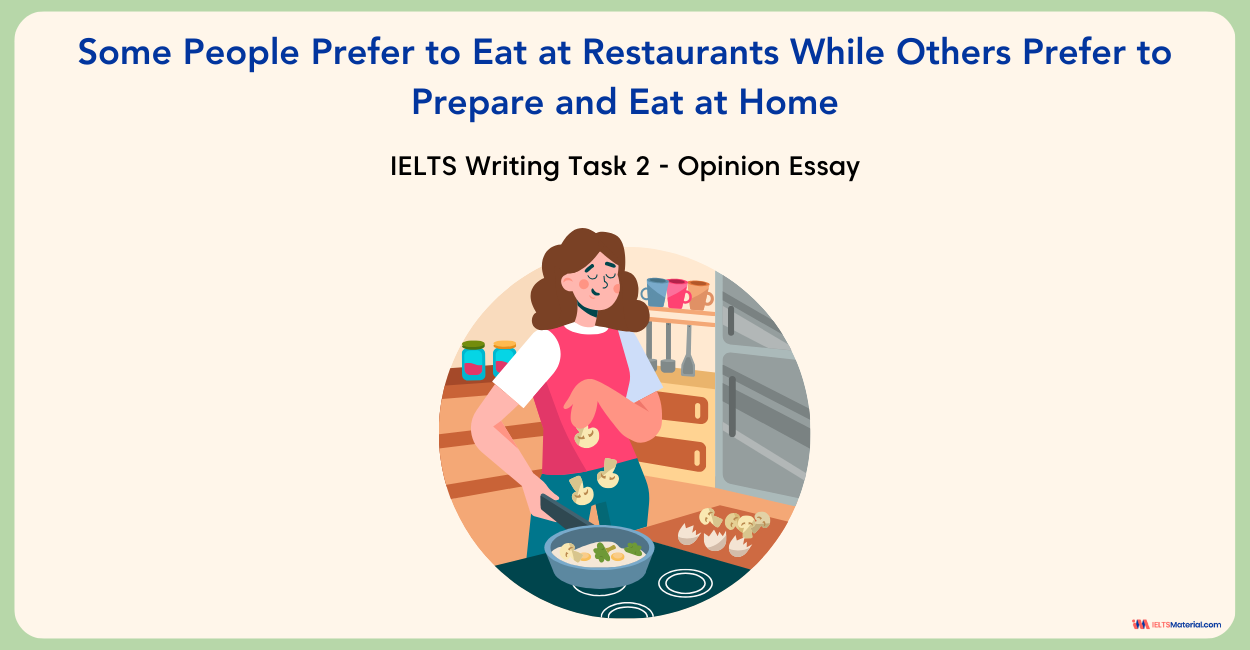
Raajdeep Saha
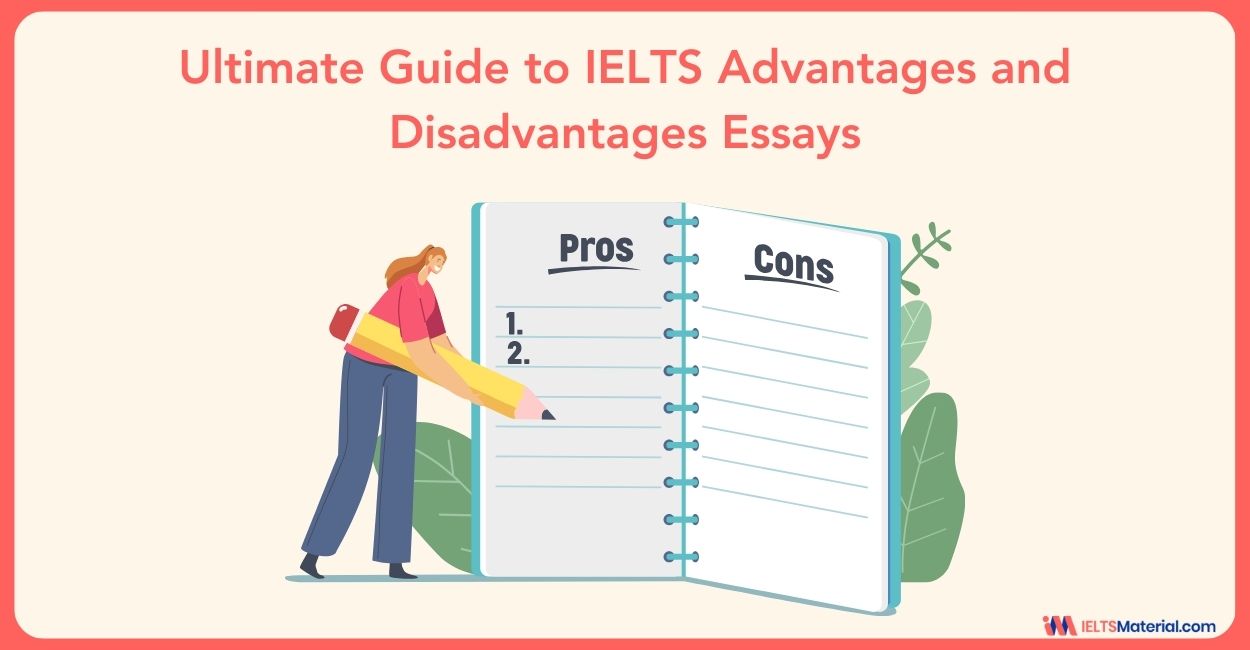
Kasturika Samanta

Nehasri Ravishenbagam

Post your Comments
Recent articles.

Our Offices
Gurgaon city scape, gurgaon bptp.
Step 1 of 3
Great going .
Get a free session from trainer
Have you taken test before?
Please select any option
Get free eBook to excel in test
Please enter Email ID
Get support from an Band 9 trainer
Please enter phone number
Already Registered?
Select a date
Please select a date
Select a time (IST Time Zone)
Please select a time
Mark Your Calendar: Free Session with Expert on
Which exam are you preparing?
Great Going!
- Scholarships
- Student Guide
- Study Abroad
- Advertise With Us
- Contact Us for Expert Assistance: Unlock Your Academic Success with Scholar Ace – 24/7 Support

Jackie Robinson Scholarship 101: Everything You Need To Know About This…

A 101 Guide To Dell Scholarship: Exploring The Application Process And…

Burger King Scholarship: A Comprehensive Guide To Winning This Prestigious Scholarship…

Finding And Applying For Scholarships: What You Need To Know Before…

The Art of Winning a Scholarship: How Art Students can Craft…

Top Ranked Apple and Android Tablets For Students in 2024

5 Must-have Tech Accessories For Students Below $50

5 Gadgets College Students Think They Need But Don’t

What Clever Electronics Do University Students Really Need?

Ten Common Mistakes you must Avoid while Crafting a Winning Resume…

Choosing the Right Research Topic for Your Proposal: How to Make…

Choosing the Right Research Methodology: Ethical Considerations you must Keep in…

CDR Report Writing Service – 3 Reasons Why Engineers Need It?…

Know Everything About Studying Abroad In Russia As An International Student

Top Budget Friendly Countries To Learn French Abroad

IFMA FMP Certification: Everything You Need to Know

The Ultimate Guide To Passing A CFE Examination

Competency Demonstration Report (CDR) Writing For Engineers Australia | Everything That…

A Guide To Kick-Starting Your Essay With A Quote

How To Write A Process Analysis Essay?

INFANT MORTALITY

“WOMEN, MARRIAGE AND TABOOS”

A Girl In The Cage Of Insecurities
7 pros and cons of studying abroad.

Table of Contents
Pros And Cons Of Studying Abroad
Studying abroad is amongst one of the biggest decisions that individuals often face when it comes to pursuing their educational goals. It’s a life-changing opportunity that only comes during a certain phase and timeline offering a plethora of learning and growth opportunities. However, this decision is not an easy one to make and aspirants are often left confused on how to go about it.
It is most likely that whoever is reading this is thinking about going away to college/university (depending on which country you live in) in another country and you’re trying to decide whether you want to take this step or not. So worry not, we’re here to help you get one step closer to making that decision. There are many pros and cons of studying abroad and we are going to shed light on all of it.
We’ve compiled an ultimate list of pros and cons of studying abroad to help you make an informed decision about studying abroad and if it’s the right choice for you.
As with life, every decision we make is based on how it might affect our lives (whether in a positive or negative manner) therefore, one needs to thoroughly think whether they want to move abroad for higher studies and will take all the challenges and unique experiences with it positively. You might’ve heard stories of all those crazy adventures your siblings and friend have been through but aren’t sure if they’re for you too or not.
Moreover, the decision does not only come with the monetary cost, it has many other factors associated with it that often leaves you to research in detail and think twice before taking the leap of faith.
Learn more: Studying High School Abroad – Top Tips and Options For International Students
Read on to discover the of pros and cons of studying abroad to guide you in making a decision that suits your interests in the best way:
PROS OF STUDYING ABROAD
Being independent:.
Moving abroad for studying purposes means that you are starting from scratch in a new area. Your parents, relatives and friends won’t be there to support you on every step of the day, which will provide you the freedom to become independent. You’ll learn how to support yourself in a newer country and depend on yourself first.
You’ll learn the basic life skills, such as cooking, cleaning and budgeting, that you won’t be able to learn in the facility of your parental home. You’ll also be stepping out of your comfort zone, learning to adapt to new situations, which will be beneficial for your future self. Most importantly, you’ll learn to make your own decisions that will have long-term effects on your life, making you responsible about yourself and those around you.
Broad thinking:
New connections:.
Oftentimes the friends in our high schools are those we made in our childhood or early teenage lives. One of the top pros of studying abroad is the rich interaction within a mix of cultures that the new place has to offer.
When you move to a new place and a new institution, it helps you in networking with different people of different race and ethnicity, and we are able to make new friends that are able to accompany us in this thrilling journey of life. Friendships made in colleges/universities go on to play an important role in shaping us as well.
You’ll be getting the opportunity to deeply connect with other students in your batch, while collaborating on various projects and sharing new experiences with each other. You’ll be able to enjoy a fun campus life with your friends, and share your achievements with them. During this you will develop lifelong friendships that will not only help you in your professional life but also be with you in your personal life.
Travelling:
Studying abroad will open up the opportunity to explore the country you’ll move to. With your newfound connections in the new place, you will get the opportunity to plan fun trips and getaways to explore the new country. You can take part in fun activities such as hikes, camping, visiting the local landscapes or renowned monuments of that particular country. This way you’ll be able to learn about their culture and history. Therefore, if you love exploring and traveling, studying abroad will provide you with just the right opportunity to fulfill your traveling dream.

Learning new languages:
One of the major pros of studying abroad is being able to interact with new people and becoming fluent in the language that is native to that country. Almost all degree programs are now taught in English, yet many students are not fluent in it. Hence, if you are planning on going to a country abroad, make sure to take a course on the native language there. Even if you choose to go to a country with native language other than English, you’ll still have to either master a new language or achieve conversational understanding to get by.
Read more: Pros and Cons of studying abroad
Experiencing new cultures:
Living in different countries can help us in interacting with people of different races, ethnicities, religions and cultures prevalent there. Students who move abroad for higher studies are able to learn and experience cultures different from what they have lived with all their lives. Young students are able to learn appreciation and love for others through taking the opportunity to observe the native culture.
Returning home:
As they say, “distance makes the heart grow fonder”, one can also say that shifting abroad to study eventually leads us in returning home (sometimes for holidays or sometimes at the end of a study program ) which can be a joyous moment for the students and their family and friends. People learn to appreciate one another when separated for long periods of time and hence when one returns home, the moments spent together are priceless.

CONS OF STUDYING ABROAD
Figuring out how to be independent:.
When we shift abroad, we have to learn to not only live on our own, but also manage each and everything; where once, we as young students only had a few chores around the house and could depend on our parents to fulfill every other responsibility, now we much cook food for ourselves, do our own laundry, learn how to pay bills and make sure to spend money within a set budget.
Learn more: Online Graduate Degrees in USA That Are Totally Worth It
Adulthood does not start after graduation, rather often times one is thrown into responsibilities as soon as one moves away from home.
Moving to a different country automatically leads to extra expenses that we have to manage on our own- one of the main cons of studying abroad. For a majority of students, they have to bear these expenses themselves rather than depending on their parents for monetary support.
Also Read: Get Free Chegg Answers From Creative Savants
Likewise not many students can afford to shift to another country, pay rent, travel expenses as well as the required tuition fees which may differ in amount depending on the exchange rate of our native country with that of the foreign one.
Not being fluent in new languages:
On the other hand, one of the major cons of studying abroad is not being fluent in the native language of the country which leads to not being able to interact with those who do not speak any English at all. However, no one can become fluent in another language in a day or two. Hence not only it is vital for someone shifting abroad to take a language test.
Cultural shock:
Shifting to a different country with a different culture can on the other hand, be daunting and the behavior or traditions followed there might come off as a cultural shock to many students unaware of the concept of traditions and cultures being given utter importance.
Eventually, you will have to adjust to these changes. Although this may seem difficult at first, the main benefit of studying abroad is exposure to a different culture. While you may have initially experienced a major change, you will learn to adapt and adjust to the new changes. This will provide you with a new perspective and also instill in you the ability of dealing with changes efficiently.

Endless chores and responsibilities:
However, for those who shift to different countries on a long term basis, find themselves at odd ends due to not being able to manage the chaotic lifestyle, along with their assignments as well as other minimal chores necessary when living alone.
Maintaining long distance friendships:
On the other hand by moving away, we are forced to leave behind those people we have known for many years and also care of. It’s not easy maintaining long distance friendships as often times the different time zones and hectic schedule do not allow us to communicate with one another as frequently in the past.
Initially students will endure loneliness and homesickness since they can no longer be physically next to their friends and family.
However, once we return home, we find ourselves missing our semi-adopted countries and its various traditions, cultures and way of life. We become used to a certain way of life and have our own routines, and hence when we return to a normal routine we had left behind, another form of cultural shock is bound to arise and leave us wondering whether we should have really returned home or not.

8. Probability of Racism Harassment:
While, overall, the countries and societies have become more tolerant of different races and nationalities, racism is still prevalent in many parts of the world. Many students across the world are still a victim of racism in the universities and the countries they choose to study. This often results in them facing bullying, lack of opportunities and low self-esteem which often makes their stay difficult in the new country. Therefore, racism attacks often come into the student’s minds when they are making the decision to study abroad.
For this purpose, it is important that you connect with the people of the university and country you have chosen to go to and research more about the place. This way, you’ll be able to make your decision more easily!
9. Endless Chores and Responsibilities:
Shifting abroad does not only come with a financial cost. Individuals, who shift abroad, often find themselves at odd ends due to not being able to manage the chaotic lifestyle, along with their classes, projects and assignments. They need to be up at their feet at all times, managing every minimal chore when living alone, while also often managing their part-time jobs that they take up to cover the expenses of living abroad.
10. Exposure to Unethical Things:
With cultural shock and a major change in exposure to people with a different lifestyle, sometimes students tend to get involved in unethical things that may harm them. Indulging in activities that may not be the best for them comes with increased exposure to different cultures and independent lifestyles. For some students, this is a major concern and also a reason for them not choosing abroad to go abroad for their education.
However, with time it does get better with time as you get accustomed to your routine and start working. For those who can’t adjust back home, they always have the option to continue their life in the country abroad. This is a major point in decision making as many students prefer to settle in the country they pursue their education from, and rather than shifting back, they utilize their network to build a future there.
Hence, the decision of moving abroad is based on multiple factors, that include your professional goals and future aspirations.
We at Scholar Ace hope we might have been of some help to you in the process of decision-making. You must remember that each person and their experience in life is unique in itself, hence, if you decide to move abroad for higher studies or you decide to acquire an education in your own country, you must make sure to completely enjoy and appreciate each and every moment in life, and opt for an opportunity that fits you best personally and professionally as well.
About Post Author
Scholar Ace
See author's posts
RELATED ARTICLES MORE FROM AUTHOR
A 101 guide to dell scholarship: exploring the application process and eligibility criteria to maximize your chances for success – march 2024, ten common mistakes you must avoid while crafting a winning resume – february 2024, finding and applying for scholarships: what you need to know before starting your research- february 2024, recent posts, jackie robinson scholarship 101: everything you need to know about this prestigious scholarship, a 101 guide to dell scholarship: exploring the application process and eligibility criteria to..., burger king scholarship: a comprehensive guide to winning this prestigious scholarship – march 2024, turnitin plagiarism checker- how to check your paper – march 2024.
- Privacy Policy
- Terms of Use
Privacy Overview

Jackie Robinson Scholarship 101: Everything You Need To Know About This...
IELTS Mentor "IELTS Preparation & Sample Answer"
- Skip to content
- Jump to main navigation and login
Nav view search
- IELTS Sample
IELTS Writing Task 2/ Essay Topics with sample answer.
Ielts writing task 2 sample 362 - what are the benefits and drawbacks of studying abroad, ielts writing task 2/ ielts essay:, many students decide to further their study abroad. what are the benefits and drawbacks of studying abroad.
IELTS Materials
- IELTS Bar Graph
- IELTS Line Graph
- IELTS Table Chart
- IELTS Flow Chart
- IELTS Pie Chart
- IELTS Letter Writing
- IELTS Essay
- Academic Reading
Useful Links
- IELTS Secrets
- Band Score Calculator
- Exam Specific Tips
- Useful Websites
- IELTS Preparation Tips
- Academic Reading Tips
- Academic Writing Tips
- GT Writing Tips
- Listening Tips
- Speaking Tips
- IELTS Grammar Review
- IELTS Vocabulary
- IELTS Cue Cards
- IELTS Life Skills
- Letter Types

- Privacy Policy
- Cookie Policy
- Copyright Notice
- HTML Sitemap
👋 Nhắn cho DOL để tìm hiểu chi tiết về các khóa học IELTS nhé!
IELTS Writing Task 2: Advantages and disadvantages of studying abroad
Studying abroad IELTS essay là một dạng bài bất hủ của kỳ thi này có lẽ một phần cũng vì một trong những mục tiêu lớn nhất khi thi IELTS là đi du học. Vì thế, đây là dạng bài bạn nên bỏ túi cấu trúc bài, một số vocabulary cũng như cấu trúc ngữ pháp xịn xò nha. Cùng DOL đi qua cấu trúc bài Advantages and Disadvantages of studying abroad essay IELTS nhé.

Đề bài sử dụng làm mẫu cho bài advantages and disadvantages of studying abroad essay IELTS lần này sẽ là:
More and more students are choosing to study at colleges and universities in a foreign country. Do the benefits of studying abroad outweigh the drawbacks?
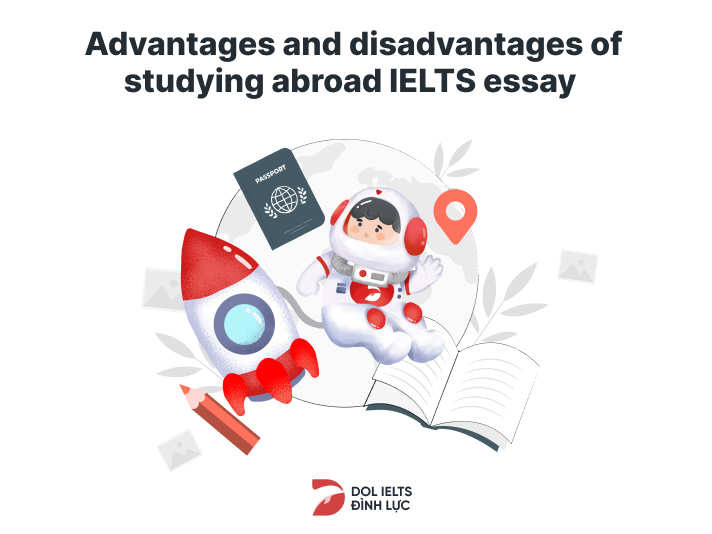
1. Outline tham khảo Advantages and Disadvantages of studying abroad
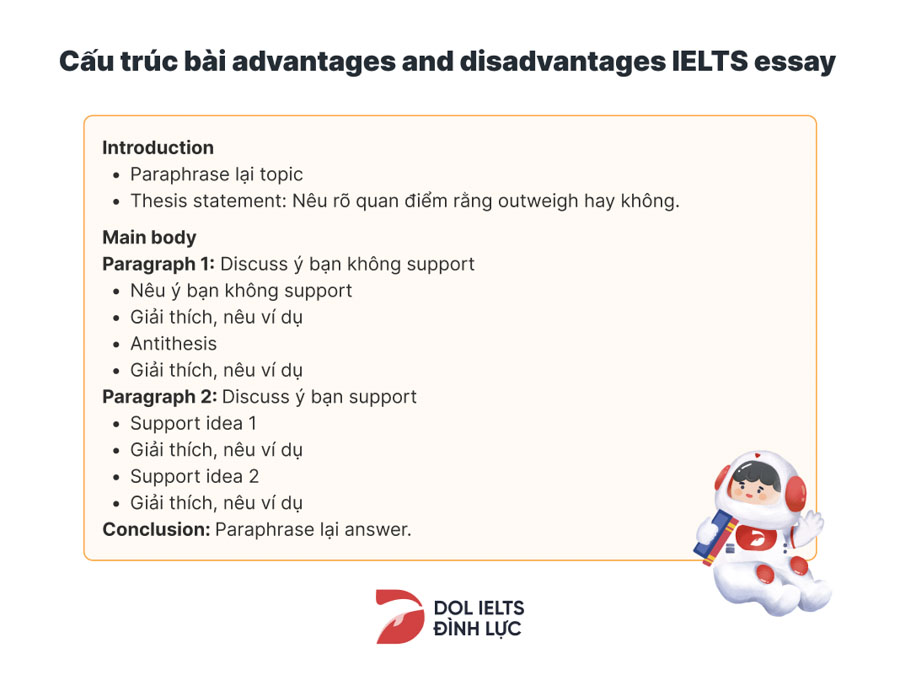
Cùng đến với outline nào. Trong outline mẫu này, DOL sẽ viết nghiêng về disadvantage của việc du học. Trong lúc
INTRODUCTION
Paraphrase the topic
Thesis: Although this (doing this) has several advantages, the drawbacks may be far more significant.
BODY 1 (Advantage)
Topic sentence 1: There can be some minor benefits to N/Ving.
Firstly, S + V. / One advantage could be that S V.
Explanation | Cause-Effect | Example
In addition, S V. / Another advantage worth mentioning is that S V.
BODY 1 (Disadvantage)
Topic sentence 2: Nevertheless, N/Ving can have serious downsides which overshadow these positive impacts.
One major drawback is that S+V
Moreover, S + V
Paraphrase the Answer: In conclusion, despite the potential benefits that N/V-ing can bring, they pale in comparison to the drawbacks involved.
2. Gợi ý idea viết Advantages and Disadvantages of studying abroad
Sau khi chốt xong cấu trúc, DOL sử dụng Linearthinking để xác định các từ khóa chính để lên ý tưởng viết bài như sau:
Advantages of studying abroad

Thesis : From my perspective, the benefits of this trend outweigh its negatives, as it greatly improves foreign language fluency and opens a wide range of job opportunities.
Body 1 - Disadvantage
Foreign country -> loneliness -> living somewhere far away seems to be impossible
Overseas colleges and universities -> academic difficulties -> only used foreign language -> language barrier -> can’t understand -> delaying in completing assignments
impossible -> insurmountable
loneliness -> homesickness -> extremity
living somewhere far away -> remaining somewhere far away/Living thousands of miles from friends and family
only used foreign language -> exclusively foreign language-oriented
can’t understand -> obstacles in comprehension
Body 2 - Advantage
Foreign country -> increasing foreign language proficiency -> native environment -> important to improve the way we use languages as we use them actively
Overseas colleges and universities -> gaining access to high-quality work options -> land a high-paid job -> valued certification
important to improve the way we use languages as we use them actively -> establishing fluency through active usage
Disadvantages of studying abroad
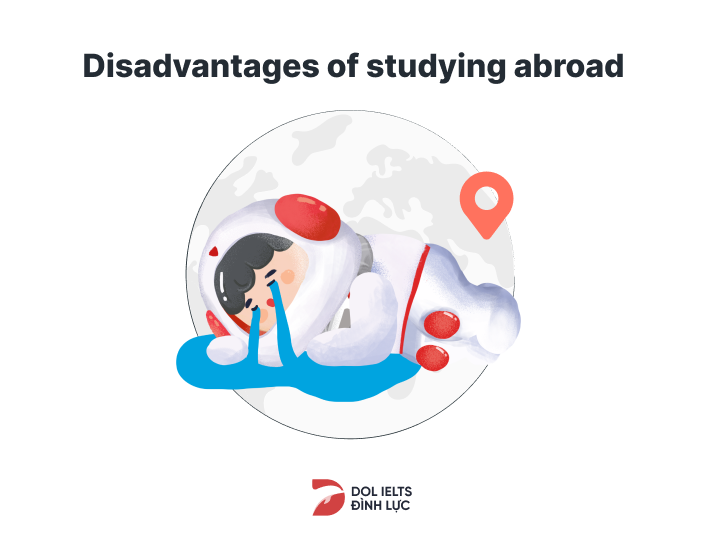
Thesis : Personally, the benefits of this trend are outweighed by its negatives, since the costs of abroad education and cultural differences might be substantial.
Body 1 - Advantage
Overseas colleges and universities -> good way to develop oneself -> immerse oneself in new lifestyles and be challenged on a daily basis -> improve personal development -> become more independent and have a sense of commitment.
Foreign country -> learn about new cultures -> fresh view of life -> broaden one’s horizon.
good way to develop oneself -> excellent way to advance oneself
immerse oneself in new lifestyles and be challenged on a daily basis -> encountering diverse lifestyles and responses to everyday challenges
become more independent and have a sense of commitment -> forces people to rely on themselves and become more self-reliant, emphasizing the need for self-discipline and commitment to the objective they have set for themselves.
fresh view of life -> fresh perspectives on life
Body 2 - Disadvantage
Overseas colleges and universities -> increased living costs -> cost of studying abroad can increase quickly -> huge costs of accommodation/food/transportation/
Foreign country -> cultural barriers -> prevent oneself from getting used to norms and practices -> minor irritations but get worse -> isolation and loneliness.
cost of studying abroad can increase quickly ->cost of studying abroad can quickly accumulate
prevent oneself from getting used to norms and practices -> make it harder to acclimatize due to the host country's various norms and practices.
minor irritations but get worse -> Although they may appear to be minor annoyances, different cultural values might aggravate
Khi gặp dạng câu hỏi "những lợi thế có lớn hơn những bất lợi không?" thí sinh phải trả lời bằng quan điểm của bản thân. Một trong những sai lầm phổ biến nhất mà thi sinh mắc phải là không trả lời được câu hỏi này. https://www.kanan.co/ielts/writing/task-2/advantages-and-disadvantages-essay/
3. Bài mẫu topic Advantages and Disadvantages of studying abroad
Cùng xem kết quả từ nhà DOL sau khi xác định cấu trúc và lên ý tưởng cho advantages and disadvantages of studying abroad essay IELTS như thế nào nhé.
Disadvantage
Today, an increasing number of students are opting to study at higher education institutions in other countries. Personally, the benefits of this trend are outweighed by its negatives, since the costs of abroad education and cultural differences might be substantial.
On the one hand, education in another country is an excellent way to advance oneself and learn about new cultures. Regarding the former, encountering diverse lifestyles and responses to everyday challenges can assist individuals in developing character as well as habits that are essential for success in life, thus improving their personal development. Moreover, living abroad forces people to rely on themselves and become more self-reliant , emphasizing the need for self-discipline and commitment to the objective they have set for themselves. Furthermore, cultural diversity might provide fresh perspectives on life. Studying abroad is a fantastic opportunity to interact with new people, learn about different ethnicity, and widen one's horizons .
On the other hand, living abroad has drawbacks such as increased living costs and cultural barriers . Firstly, the cost of studying abroad can quickly accumulate . Although tuition and living expenses might vary based on location, these costs are often considerable since the most desirable places for study are often first-world countries. Furthermore, expenditures, such as food and transportation, are unavoidable to live comfortably. Another downside involves cultural differences, which might make it harder to acclimatize due to the host country's various norms and practices. Although they may appear to be minor annoyances , different cultural values might aggravate a foreigner. For instance, a misinterpretation of friendliness and a sense of rejection can lead to isolation and loneliness.
In conclusion, I feel the drawbacks of studying overseas exceed the benefits, considering the expensive costs of international education and the large cultural gaps.
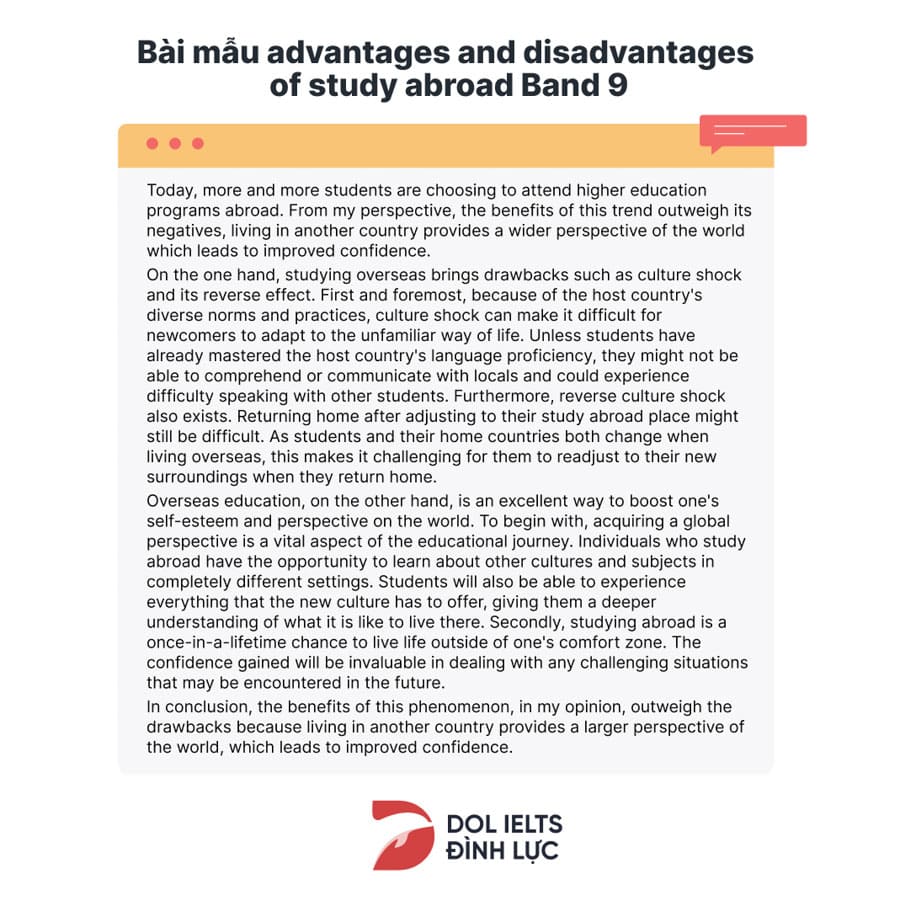
Today, more and more students are choosing to attend higher education programs abroad. From my perspective, the benefits of this trend outweigh its negatives, living in another country provides a wider perspective of the world which leads to improved confidence.
On the one hand, studying overseas brings drawbacks such as culture shock and its reverse effect. First and foremost, because of the host country's diverse norms and practices, culture shock can make it difficult for newcomers to adapt to the unfamiliar way of life. Unless students have already mastered the host country's language proficiency, they might not be able to comprehend or communicate with locals and could experience difficulty speaking with other students. Furthermore, reverse culture shock also exists. Returning home after adjusting to their study abroad place might still be difficult. As students and their home countries both change when living overseas, this makes it challenging for them to readjust to their new surroundings when they return home.
Overseas education, on the other hand, is an excellent way to boost one's self-esteem and perspective on the world. To begin with, acquiring a global perspective is a vital aspect of the educational journey. Individuals who study abroad have the opportunity to learn about other cultures and subjects in completely different settings. Students will also be able to experience everything that the new culture has to offer, giving them a deeper understanding of what it is like to live there. Secondly, studying abroad is a once-in-a-lifetime chance to live life outside of one's comfort zone. The confidence gained will be invaluable in dealing with any challenging situations that may be encountered in the future.
In conclusion, the benefits of this phenomenon, in my opinion, outweigh the drawbacks because living in another country provides a larger perspective of the world, which leads to improved confidence.
📖 DOL xin gửi bạn một vài chủ đề tham khảo khác:
Global warming IELTS Writing
DOL hy vọng là bài viết trên đã giúp bạn biết nhiều hơn về advantages and disadvantages of studying abroad essay IELTS để có thể áp dụng tự học hiệu quả.
Nếu có bất kỳ thắc mắc gì về IELTS Speaking hay các kỹ năng, đừng ngần ngại mà liên hệ DOL qua các kênh sau bạn nhé: website , Facebook .
Chúc bạn thành công.
Câu hỏi thường gặp:
Gợi ý trả lời câu hỏi: What are the advantage and disadvantage of studying abroad?
Advantages:
Build a better network
Learn about new cultures
Develops confidence
Provides a wider perspective
Disadvantages: Unforeseen circumstances can cut short your studies
Gợi ý trả lời câu hỏi: What are the main problems of studying abroad?
Accommodation problems
Time zone annoyances
Financial/Monetary problems
Overcoming the language barrier
Living an independent lifestyle
Gợi ý trả lời câu hỏi: Why is studying abroad is better?
With study abroad, you can experience new places and cultures, make friends from around the world, and gain a global perspective–while earning credits towards your degree. It will allow you to develop highly-valued skills such as intercultural communication, foreign languages, adaptability, and problem-solving.
Những từ vựng tiếng Anh về chủ đề Studying Abroad
Achievement: giải thưởng; Academic record: thành tích học tập; Application form: đơn xin nhập học; Boarding school: trường nội trú; Bachelor degree: bằng cử nhân; Bursary: học bổng; Brochure: sách giới thiệu về trường; Boarding school: trường nội trú; Comprehensive school: trường tổng hợp; Class, class hour, contact hour: tiết học
Candidate: thí sinh; Consultant/ Education adviser: chuyên viên tư vấn du học; College: đại học chuyên ngành/ Trường cao đẳng; Complementary education: bổ túc văn hóa; Candidate-doctor of science : Phó Tiến sĩ; Certificate of graduation: bằng tốt nghiệp; Day school: trường bán trú; Degree/qualification: bằng cấp, chứng nhận tốt nghiệp; Director of studies: trưởng phòng đào tạo
Director of studies : trưởng phòng đào tạo; Design/Develop/ plan a course/ curriculum/program/syllabus: thiết kế/phát triển/ lên kế hoạch cho khóa học/ chương trình giảng dạy/ chương trình học/giáo trình; Education agent: trung tâm tư vấn du học; Elective: tự chọn bắt buộc; Extracurricular activity: hoạt động ngoại khóa; Education fair: triển lãm giáo dục; Financial aid: hỗ trợ tài chính; Final exam: thi tốt nghiệp; Fail (an exam): trượt; Letter of admission: thư đồng ý nhập học
Bài viết khác
Bộ sách tổng hợp bài mẫu ielts writing sample 2023.
DOL IELTS Đình Lực dành tặng miễn phí bộ sách TỔNG HỢP BÀI MẪU IELTS WRITING SAMPLE 2023. Tải về ngay ở dưới đây các bạn nhé!

Bộ đề thi IELTS Writing 2023 thực tế tổng hợp đầy đủ kèm bài mẫu
Chuẩn bị cho kỳ thi IELTS, đặc biệt là phần thi Writing, luôn là nỗi lo của nhiều bạn học. Để tự tin chinh phục phần thi này, bạn cần nắm rõ cấu trúc đề thi, các dạng câu hỏi thường gặp và có sự luyện tập thường xuyên. Hiểu được nhu cầu đó, DOL đã tổng hợp và biên soạn bộ đề thi IELTS Writing 2023 chính thức tại IDP & BC kèm bài mẫu. Bộ đề này sẽ giúp bạn hiểu rõ cấu trúc đề thi và các dạng câu hỏi thường gặp, luyện tập trả lời các câu hỏi theo hướng dẫn của giám khảo và tăng khả năng phản xạ và tự tin trong phòng thi. Hãy cùng DOL tìm hiểu chi tiết bộ đề IELTS Writing 2023!

Đề thi IELTS Writing 2024 chính thức tại IDP & BC và bộ đề IELTS Writing Forecast mới nhất
Hiểu rõ xu hướng đề thi IELTS Writing ngày càng trở nên khó khăn hơn, việc tham khảo các bài thi trước đây là vô cùng quan trọng đối với những người học IELTS. Để hỗ trợ bạn có tài liệu đa dạng và mới nhất, DOL đã tổng hợp đề thi IELTS Writing 2024 từ hai trung tâm uy tín là IDP và British Council (BC), cung cấp bài mẫu được cập nhật nhanh chóng và chính xác. Điều này giúp bạn luyện thi IELTS nắm bắt được xu hướng và mức độ khó của các đề thi. Danh sách này sẽ được cập nhật thường xuyên với những đề thi mới nhất, vậy nên hãy tiếp tục theo dõi để không bỏ lỡ bất kỳ thông tin nào!

Tổng quan về IELTS Writing Test (Task 1 và 2)
IELTS Writing là một trong những kỹ năng khó ăn điểm nhất của kỳ thi IELTS, đặc biệt là đối với thí sinh Việt Nam. Điều này thể hiện qua điểm thi Writing trung bình của người Việt Nam khá thấp, chỉ đạt khoảng 5.5 - 6.0. Bài thi này đánh giá khả năng diễn đạt bằng tiếng Anh của thí sinh thông qua hai nhiệm vụ chính là Writing Task 1 và Task 2. DOL sẽ cung cấp cho bạn thông tin tổng quan về IELTS Writing, bao gồm. • Cấu trúc bài thi IELTS Writing: gồm Task 1 và Task 2 • Cách tính điểm bài thi IELTS Writing: dựa trên 4 tiêu chí Task Achievement/Response, Coherence and Cohesion, Lexical Resource, Grammatical Range and Accuracy • Bài mẫu IELTS Writing
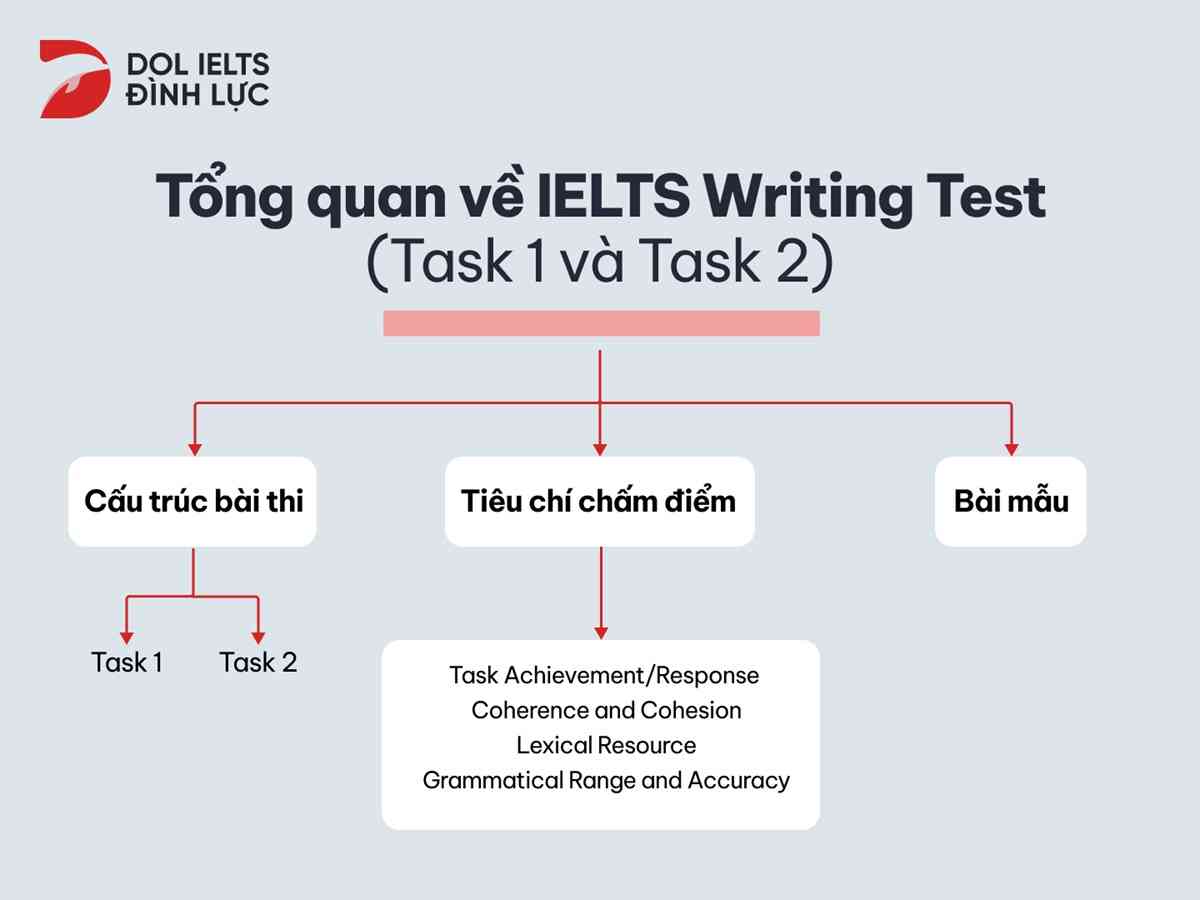
Bộ sách Tổng hợp Bài mẫu IELTS Writing & Speaking Sample 2023
DOL IELTS Đình Lực dành tặng miễn phí bộ sách TỔNG HỢP BÀI MẪU IELTS WRITING & SPEAKING SAMPLE 2023. Tải về ngay ở dưới đây các bạn nhé!

Đăng ký test đầu vào IELTS miễn phí và nhận tư vấn
Nhắn tin DOL qua Facebook
Click để nhắn tin với DOL qua fanpage chính
Gọi điện liên hệ
Liên hệ DOL qua hotline miễn phí: 1800 96 96 39
DOL có 15+ cơ sở tại TP.HCM, Hà Nội và Đà Nẵng
Click để xem địa chỉ chi tiết


IMAGES
VIDEO
COMMENTS
Pros and Cons of Studying Abroad: Essay Conclusion. All in all, there exist many more pros and cons of studying abroad. However, the bottom line is that students wishing to study abroad must prepare themselves thoroughly before jumping into the next plane to take them abroad. As discussed in the essay, studying abroad brings immense ...
Pros of Study Abroad: Cons of Study Abroad: 1. You will learn to think more broadly. 1. Studying abroad can be expensive. 2. You will make lifelong connections. 2. There will be language barriers. 3. You will gain a competitive edge. 3. You may experience culture shock. 4. You will build your language skills. 4. You might get homesick. 5.
Studying abroad exposes people to different cultures. It teaches about different cultural practices such as rites, rituals and relations. It helps people appreciate these different cultures, as well. It also educates about different ways of living for example the foods people eat and pass-time activities in which they involve themselves.
One of the most significant advantages of studying abroad is the opportunity for cultural immersion. Students get the chance to live in a new country, interact with locals, and experience day-to-day life from a different cultural perspective. Immersion in a new culture exposes students to unique traditions, customs, and ways of life, fostering ...
Pros and cons of studying abroad. Studying abroad is an exciting opportunity for students to explore new cultures, gain new experiences, and broaden their perspectives. It is a chance to step out of your comfort zone and into a new world, but like any decision, studying abroad comes with both pros and cons. Exposure to new cultures: Studying ...
Here are a few of the cons of studying abroad. 1. Studying abroad can be expensive. Not going to lie, there is definitely a financial burden that can come with studying abroad. Typically, the fees for your study abroad program will vary depending on the length and type of the program.
While studying abroad is an amazing opportunity, it is not for everyone. Before saying yes, you should weigh the benefits and disadvantages of studying abroad. Pros. Cons. You'll Make New Friends. You May Get Homesick. You'll Open the Door to New Opportunities. You May Experience Culture Shock. You'll Learn a New Language.
Pro: Making new friends. Alice Zurek from Sweden attended Australia's La Trobe University to study tourism management. Her favorite part of studying abroad was meeting new people, making friends and enjoying experiences she'd never had before. Alice Lee from Taiwan agrees. She is studying editing and publishing at Monash University.
This essay will examine all the advantages and potential drawbacks of studying abroad. Students studying abroad can interact with people from different cultures and experience new cultures firsthand. You gain a better knowledge of regional cultures, norms, and values. Additionally, it opens new doors and widens your perspectives.
In conclusion, studying abroad has its advantages and disadvantages, but as discussed in the essay, the pros are more than the cons. However, every learner who intends to study abroad should assimilate only the beneficial and safe culture and customs from that country and completely abstain from bad customs or habits.
The more advanced the country, the higher the expenses. Also Read: Guide to Ace The Advantages & Disadvantages Essay Questions in IELTS Writing Task 2. #2. Language as a Barrier. One of the biggest problems that many students face while studying abroad is the language that they are not fluent in.
1 Pros of studying abroad. 1.1 Getting out of your comfort zone. 1.2 Learning how to live independently. 1.3 Making new friends. 1.4 Seeing the world and making unforgettable memories. 1.5 Learning about a new language and culture. 1.6 Employers like it.
Besides new experiences and friends, studying abroad may make people gain a lot more things. For example, spending time in a country you don't know may increase your confidence, make you a stronger person. Moreover, you can learn a new language and learn about a new culture that could be desirable. However, this trend has drawbacks as well as ...
Advantages. First, students can participate in study abroad programs to travel overseas for a set period. Students are encouraged to immerse themselves in a foreign culture to gain a better understanding of other people and their customs, as well as to improve their language skills. When learners go abroad to school, they get to immerse ...
Explore band 9 sample answers for the advantages and disadvantages of studying abroad in this IELTS Writing Task 2 Essay along with band 9 vocabulary for IELTS. ... However, there are both pros and cons to studying abroad, making it a challenging decision to take. In the following paragraphs, I will go through the advantages and disadvantages ...
Exchange rates can have both a positive and negative effect on your cost of living, food and drink, and tuition fees (if you're required to pay in the currency of the country you're applying to study in). Pros. Cons. Many international universities do not charge exchange students tuition fees. UK residents who apply directly to non-UK ...
Learning new languages: One of the major pros of studying abroad is being able to interact with new people and becoming fluent in the language that is native to that country. Almost all degree programs are now taught in English, yet many students are not fluent in it. Hence, if you are planning on going to a country abroad, make sure to take a ...
Studying abroad is an important and valuable experience that offers students a chance to gain new cultural perspectives, expand their knowledge and skills, and become more independent and confident. Cultural immersion is one of the significant advantages of studying abroad, providing exposure to new cultures and languages, learning about customs, traditions, and lifestyles, and developing ...
In conclusion, studying abroad has its pros and cons. However, as I stated above, that the advantages are the prominent feature. Subsequently, every student, if intended to study overseas, should pick out the good and beneficial merits from that country and extremely abstain from the ugly habits or customs.
In this opinion essay, I will discuss my perspective on studying abroad, delving into the advantages it offers, as well as the obstacles that students may encounter. Studying abroad is more than just a journey; it's a transformative experience that broadens horizons, fosters cultural understanding, and equips individuals with valuable skills ...
Essay on Pros and Cons of Studying in a Foreign Country. This essay sample was donated by a student to help the academic community. Papers provided by EduBirdie writers usually outdo students' samples. Owing to the fact that deciding to study abroad is an extraordinary opportunity to acquire a knowledge of cultures which might enable foreign ...
The Pros and Cons of Studying Abroad: A Personal Opinion Essay Pages: 3 (873 words) Education: Effects of Studying Abroad Pages: 5 (1411 words) Difficulties of Studying Abroad Pages: 1 (295 words) Studying Abroad: Perspectives for Students Pages: 2 (409 words) Challenges of Studying Abroad Pages: 4 (1088 words)
IELTS Writing Task 2: Advantages and disadvantages of studying abroad . Studying abroad IELTS essay là một dạng bài bất hủ của kỳ thi này có lẽ một phần cũng vì một trong những mục tiêu lớn nhất khi thi IELTS là đi du học. Vì thế, đây là dạng bài bạn nên bỏ túi cấu trúc bài, một số ...